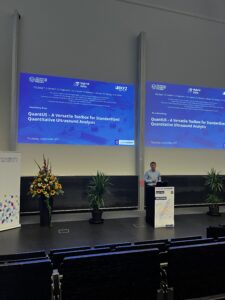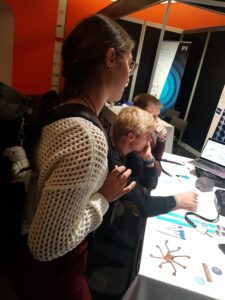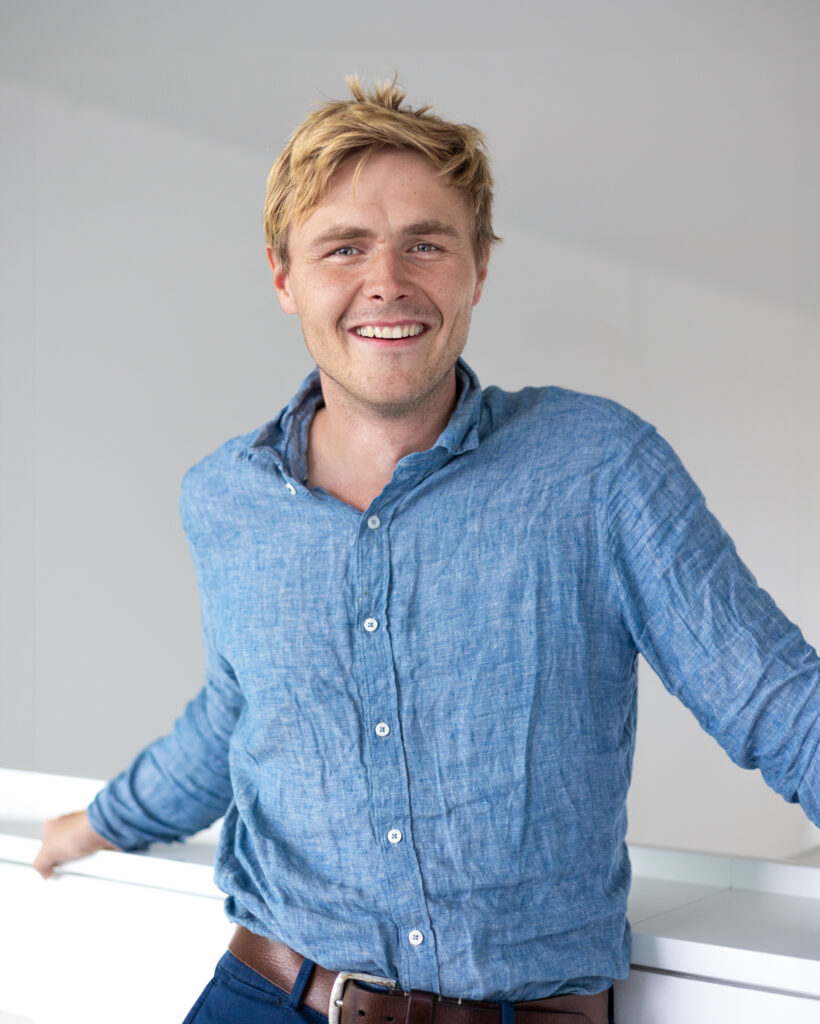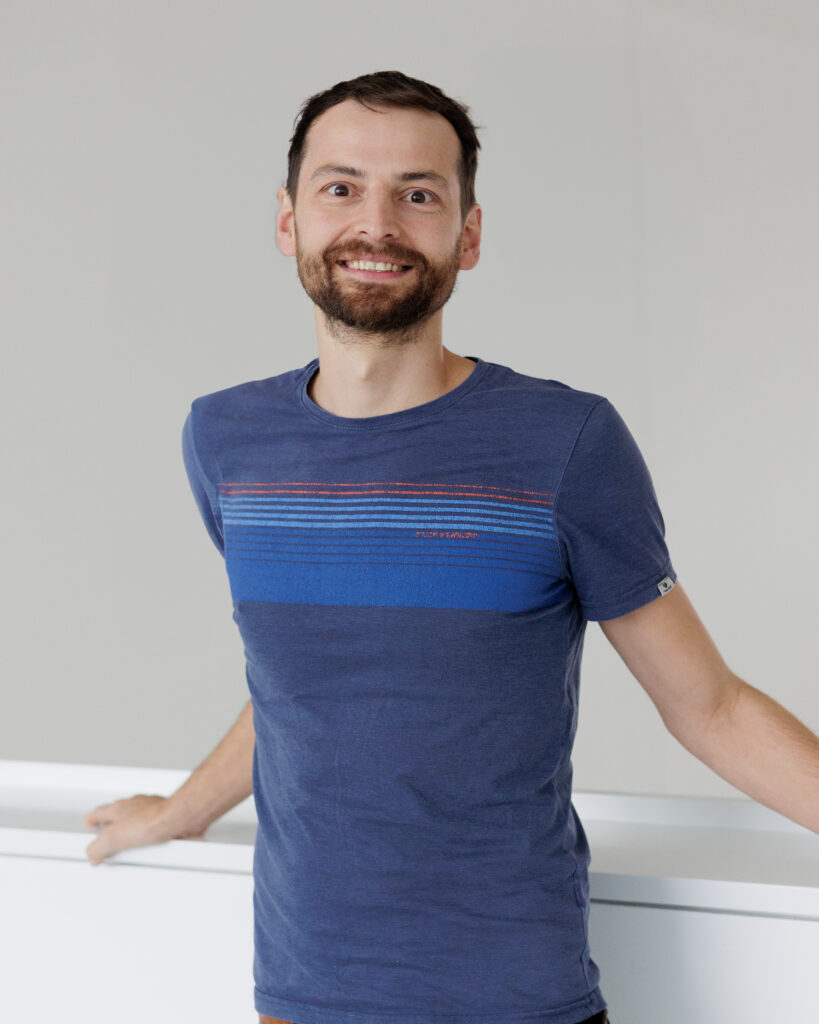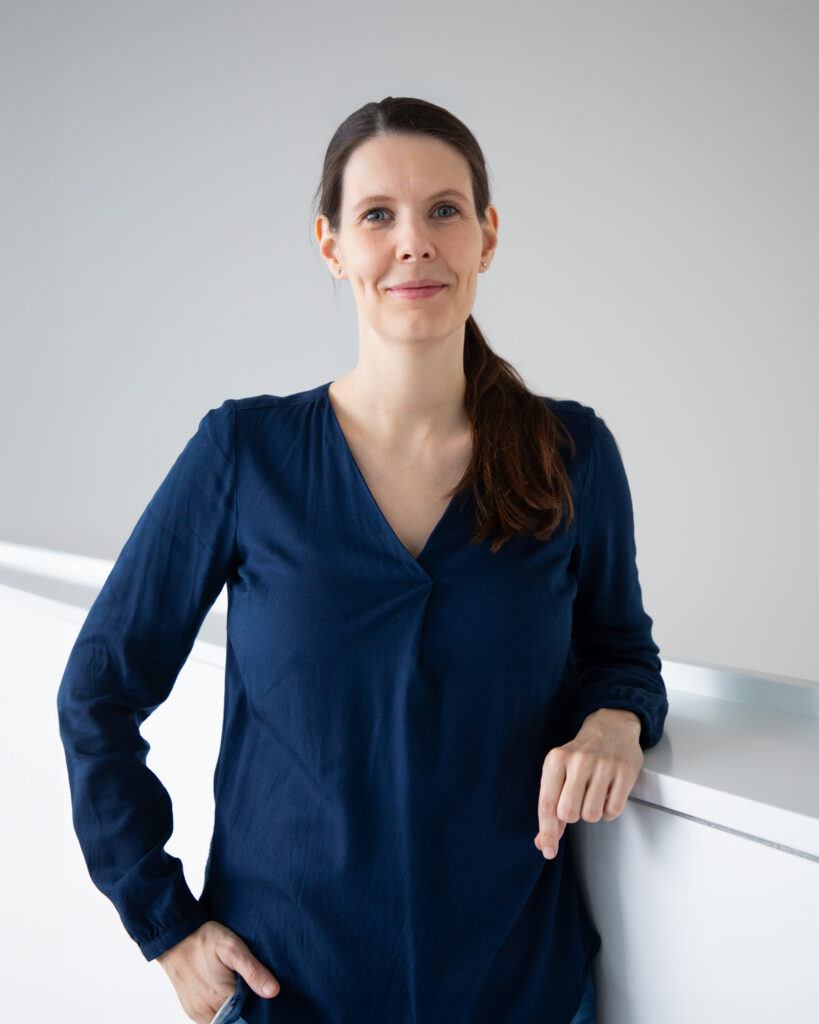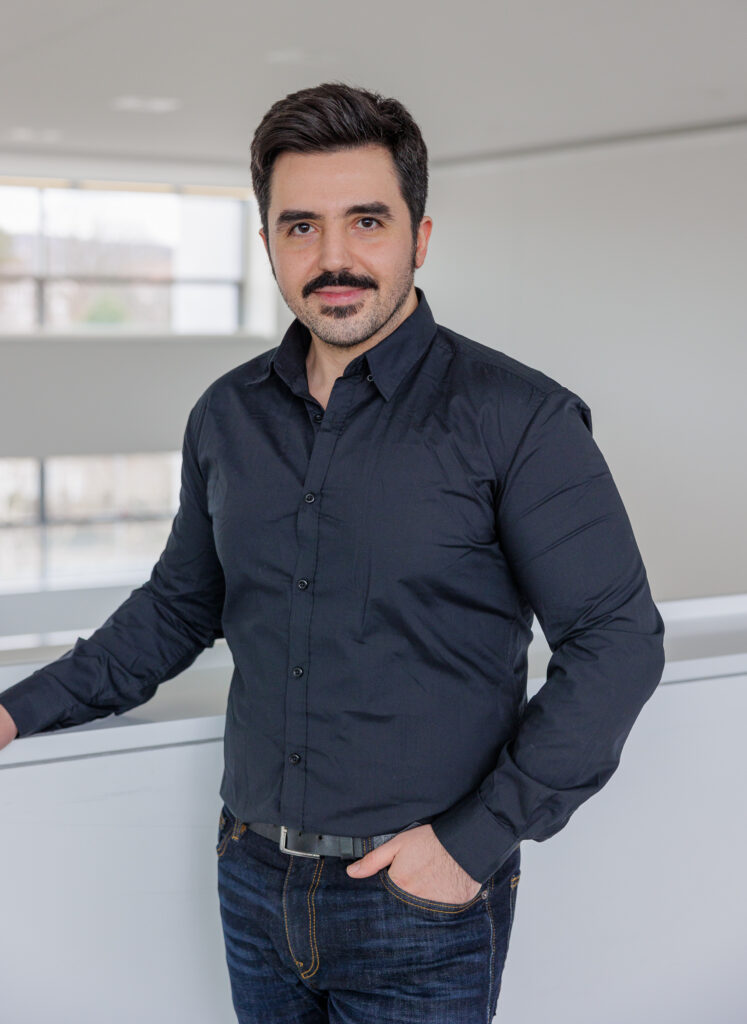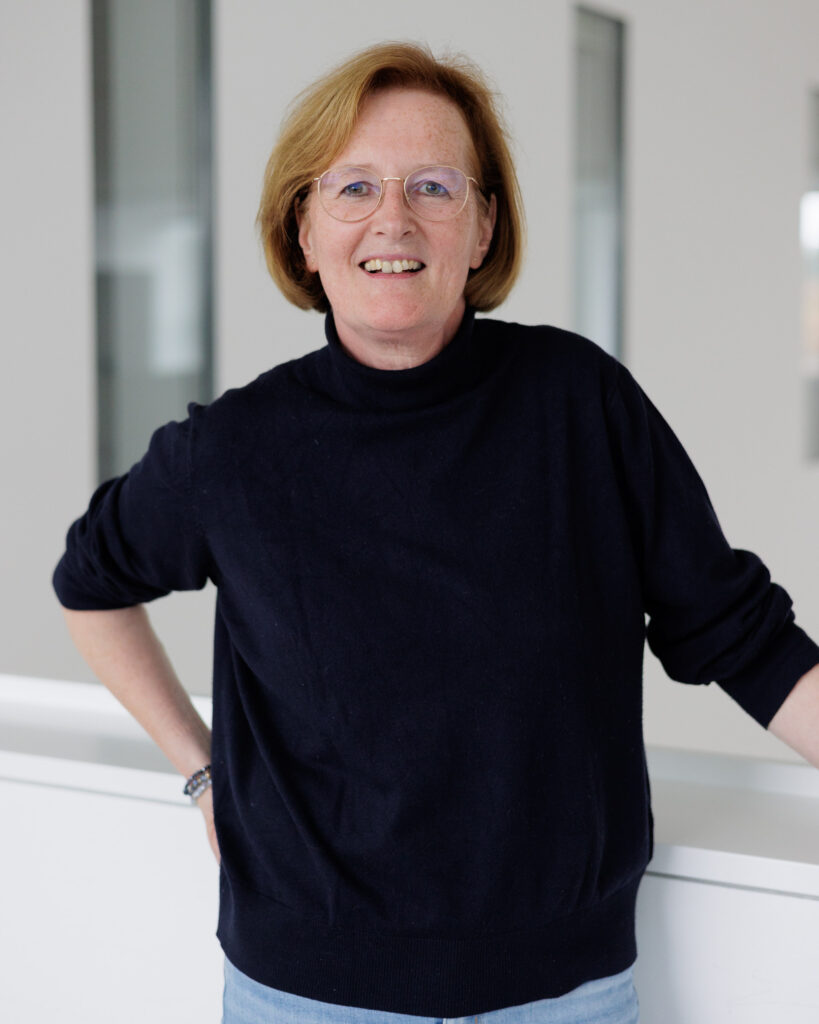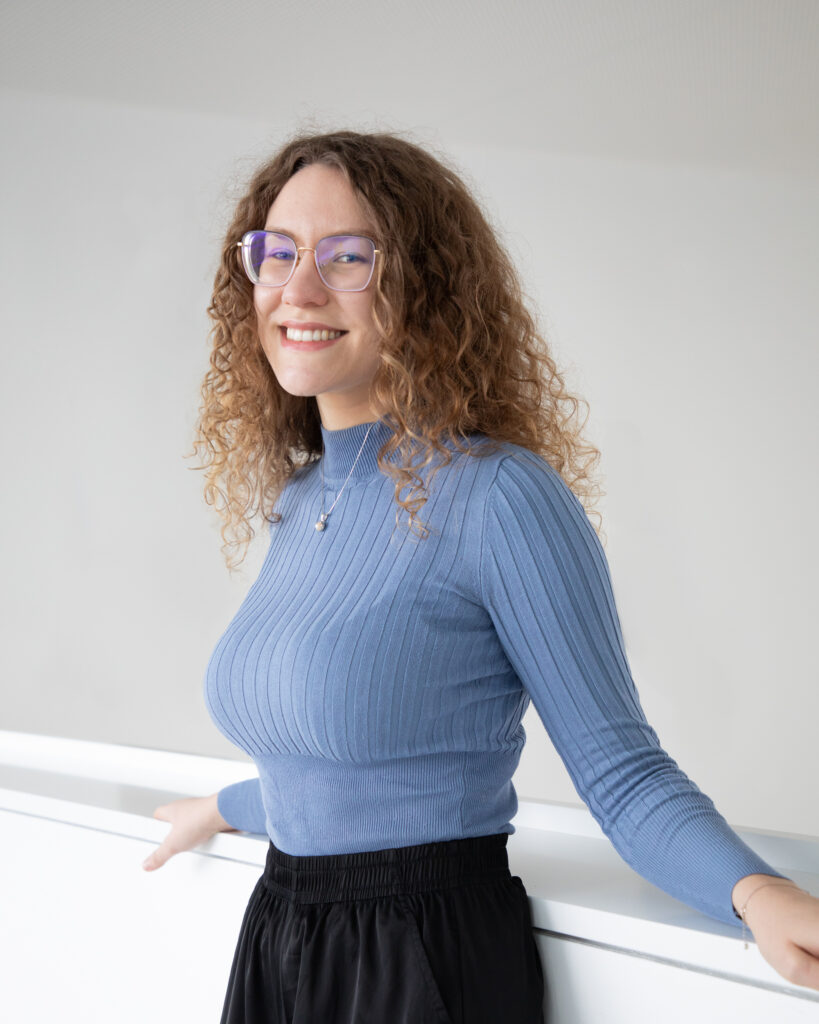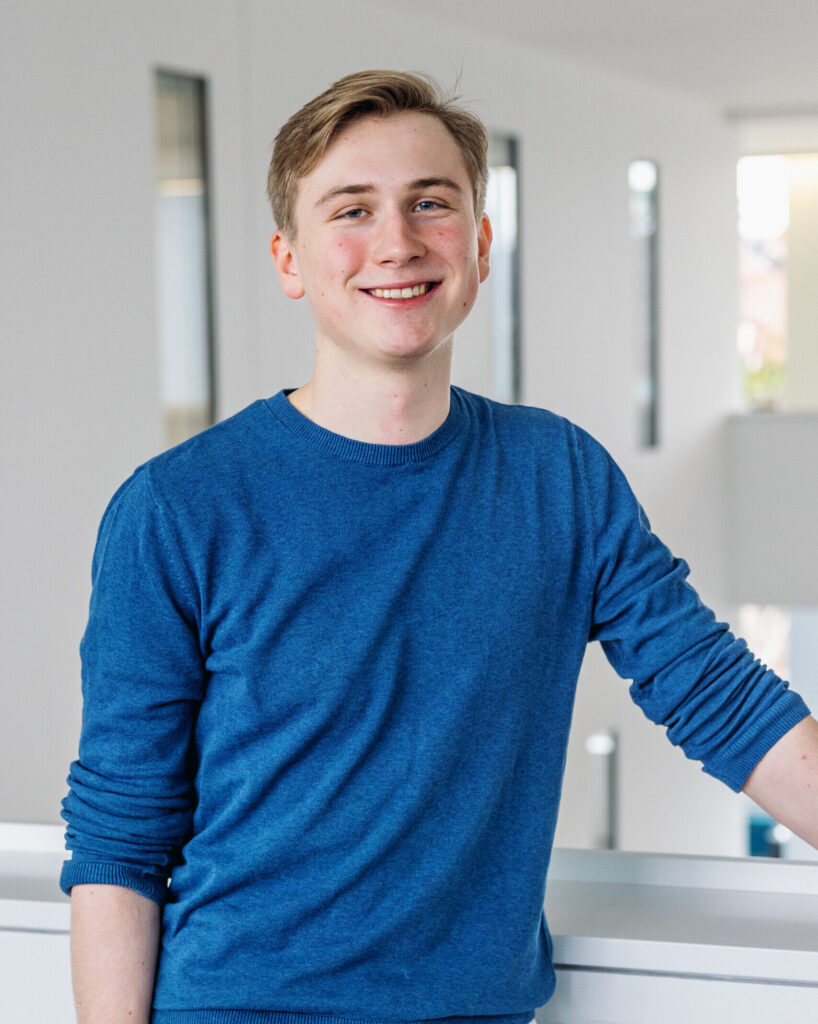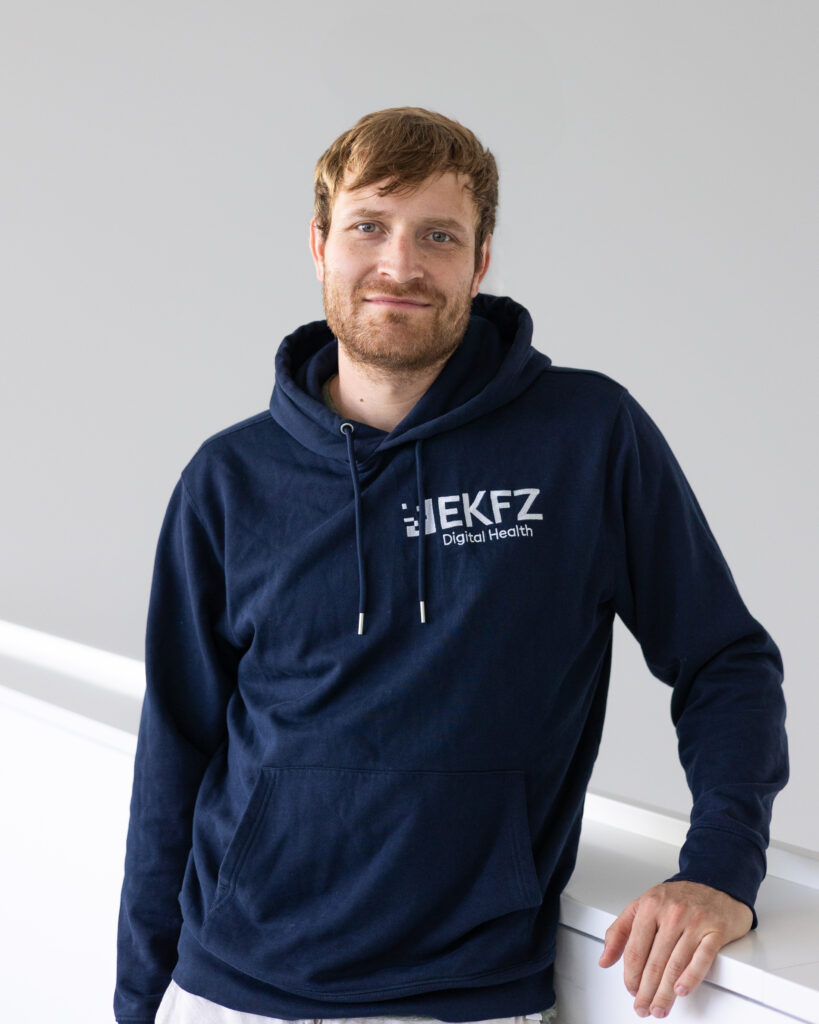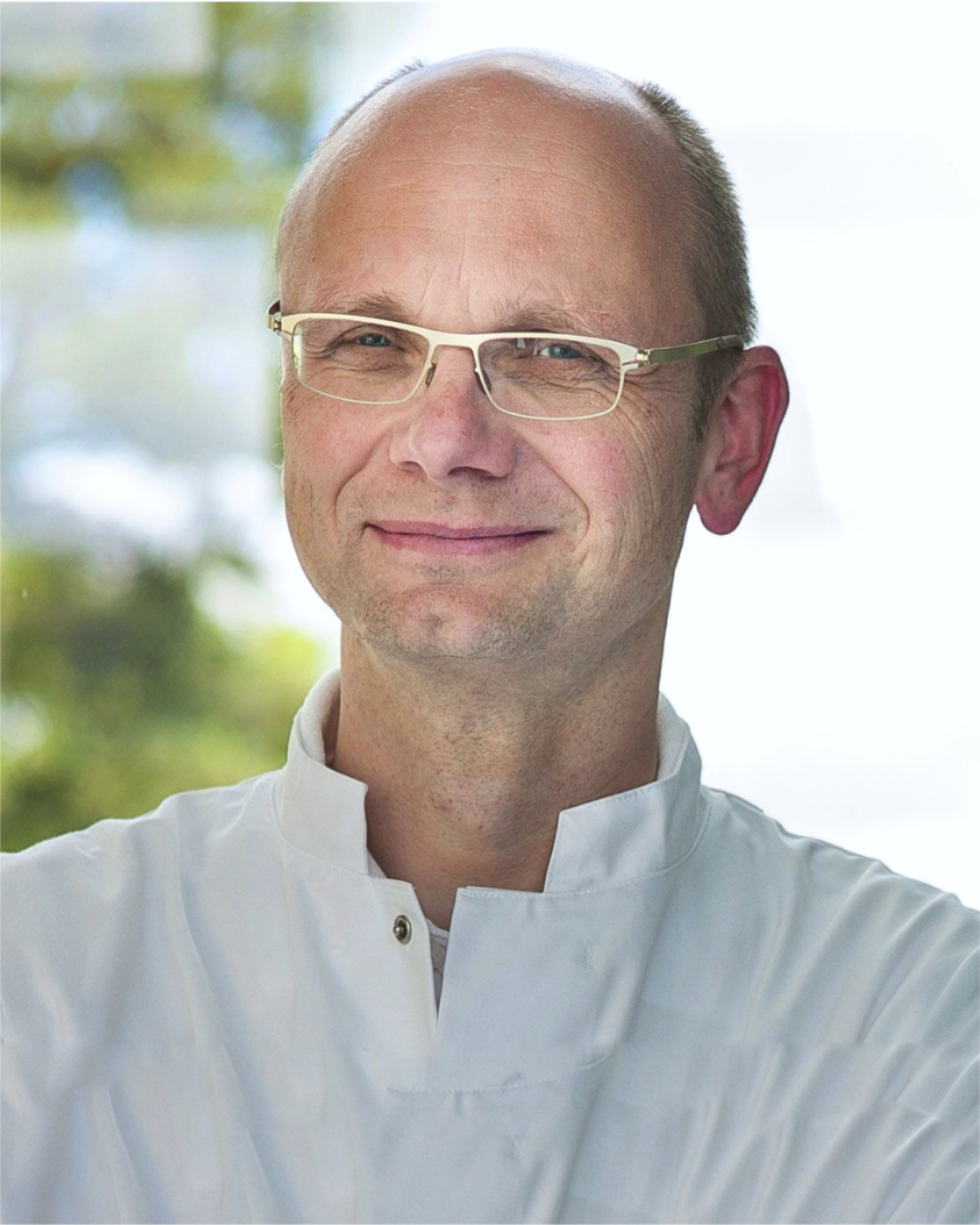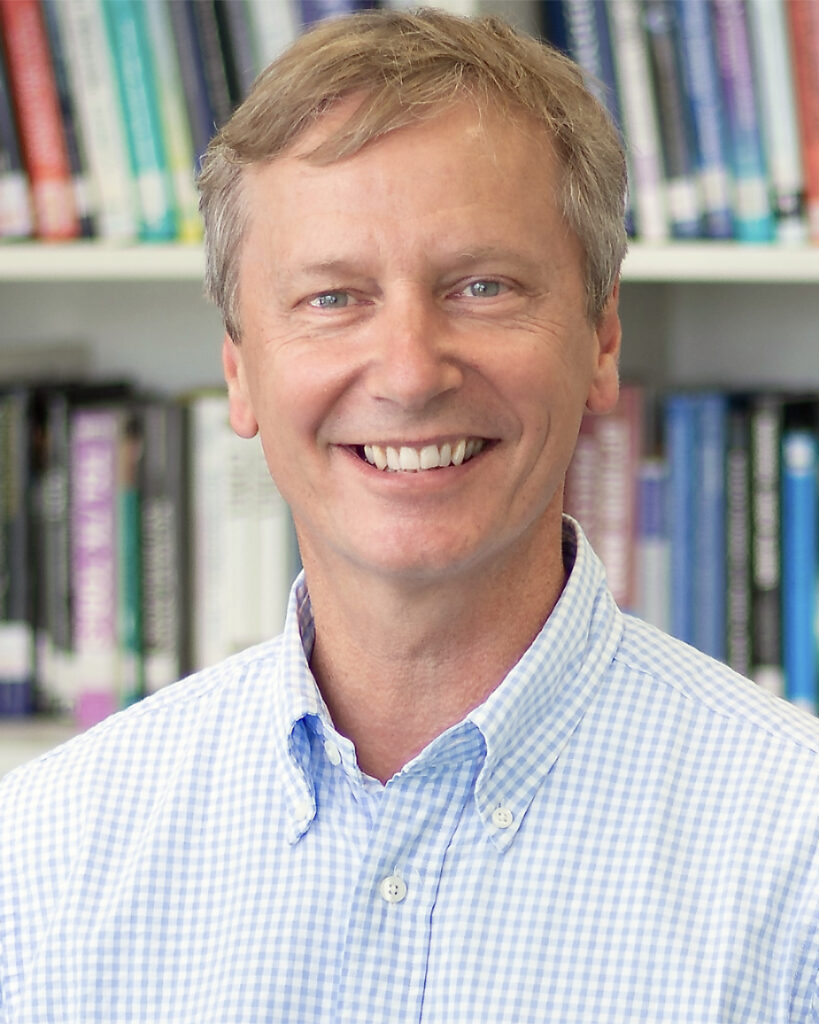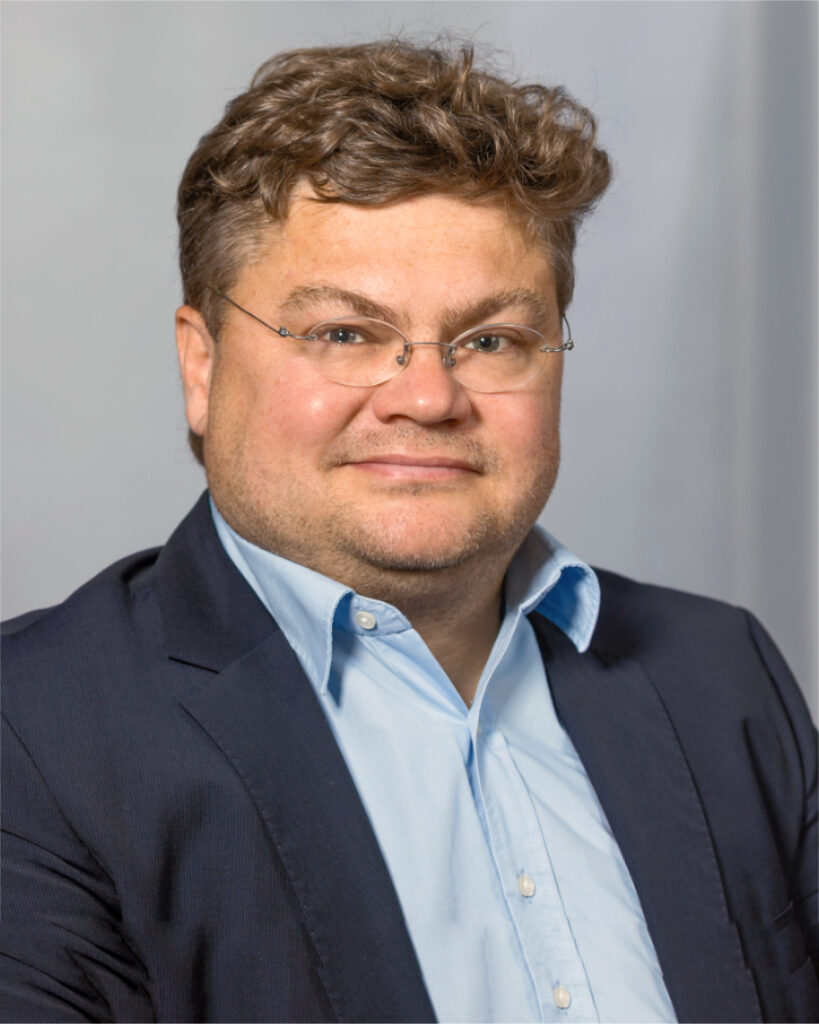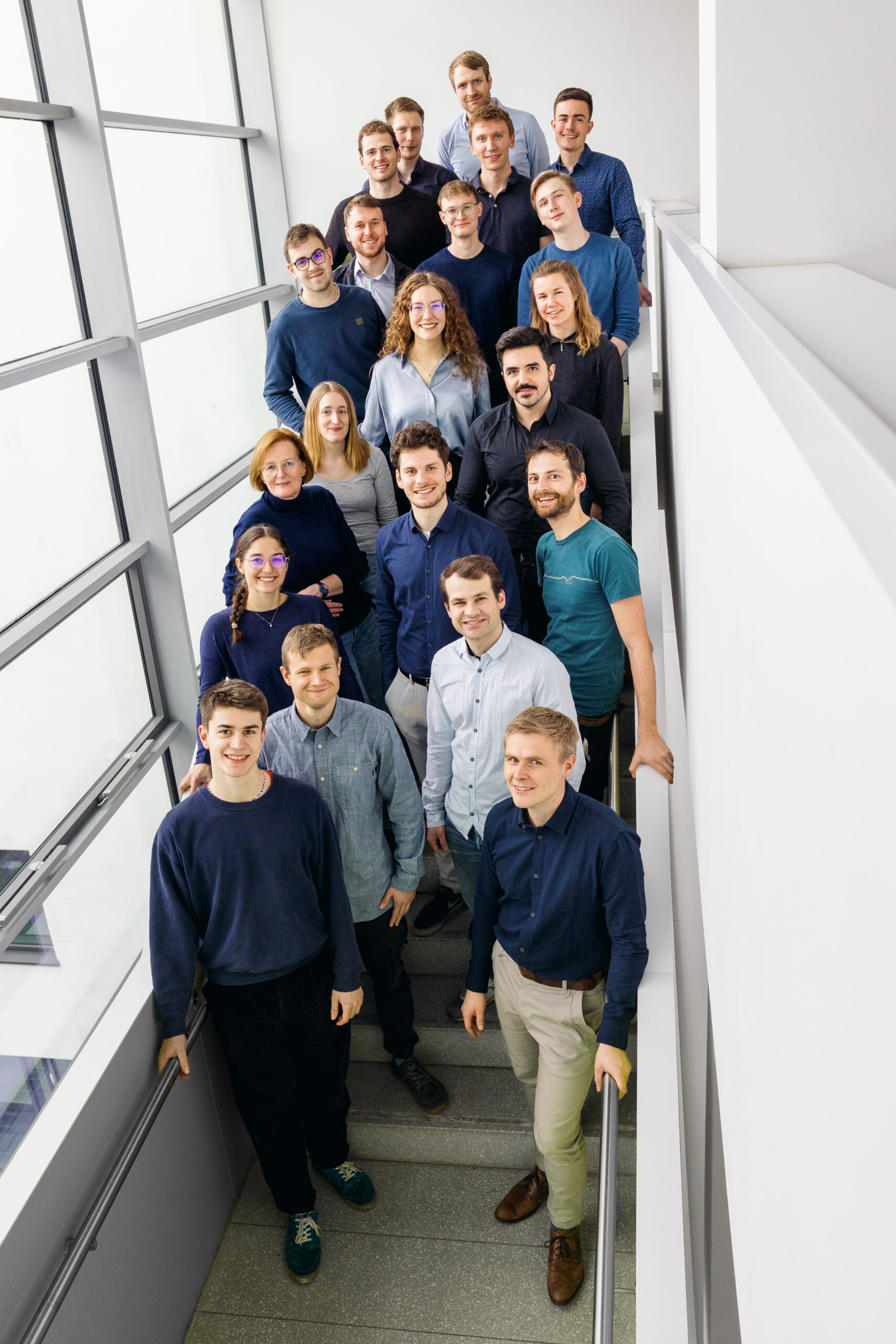Medical ultrasound has transformed diagnosis and management in all areas of clinical medicine. However, current ultrasound imaging has limited spatial resolution, depends on bulky devices and is highly user dependend. HybridEcho is an interdisciplinary group of engineers, computer scientists and physicians working on methods and technologies to resolve these issues.With our research group we cover the complete area of medical ultrasound, from transducer development over signal processing to clinical studies.

Merit Städler finishes Diploma Thesis
Over the past year, Merit developed a CMUT characterization method as part of a research seminar and later applied it during her diploma thesis to analyze ten CMUT variants from Infineon Dresden. By examining key parameters such as sensitivity, bandwidth, noise-equivalent pressure, and dynamic range, she evaluated different CMUT designs for their suitability as ultrasound receivers. Based on the insights gained from the characterization and the resulting data, the HybridEcho collaborated with Infineon to develop new design variants for a second tape-out.
In November she sucessfully defended her diploma thesis
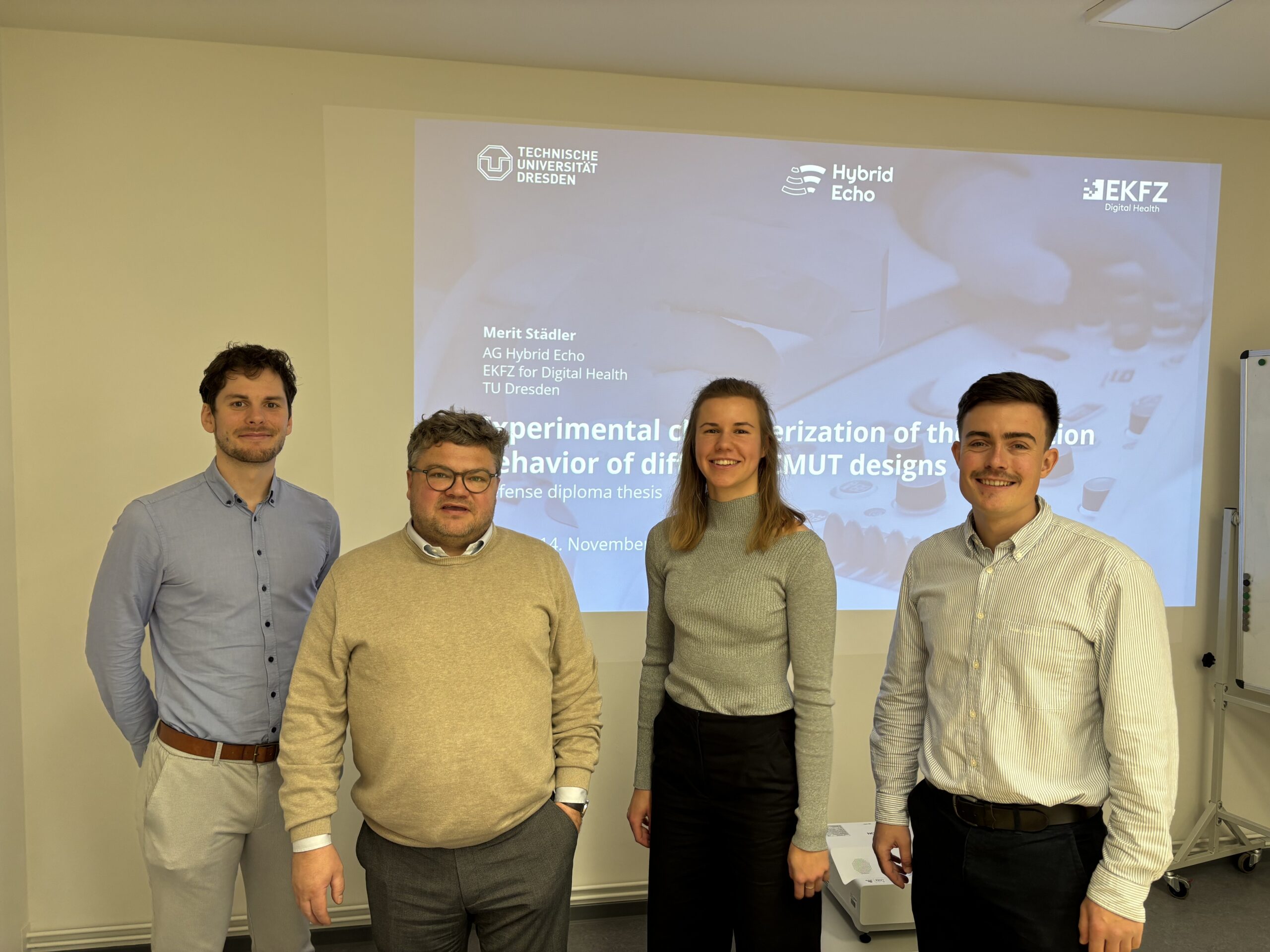
Research Stay in San Diego Strengthens International Collaboration
In autumn, Moritz Herzog completed a seven-week research stay in San Diego in the group of Prof. Ahmed El Kaffas. During this time, he worked on Ultrasound Localization Microscopy (ULM) and quantitative ultrasound techniques, gaining valuable insights into advanced imaging methods.
The stay not only deepened the scientific exchange between both groups but also laid the foundation for a long-term partnership. As a next step, the teams aim to establish a student and researcher exchange program between Dresden and San Diego to foster collaborative projects in medical ultrasound imaging.
This visit represents an important milestone in expanding HybridEcho’s international network and supports the translational focus of the group’s research activities.
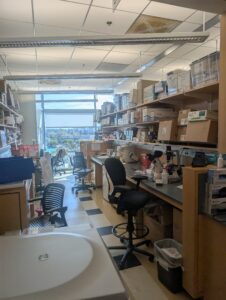
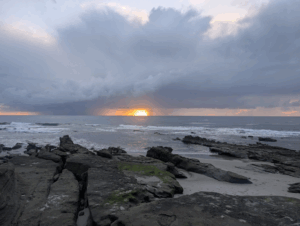
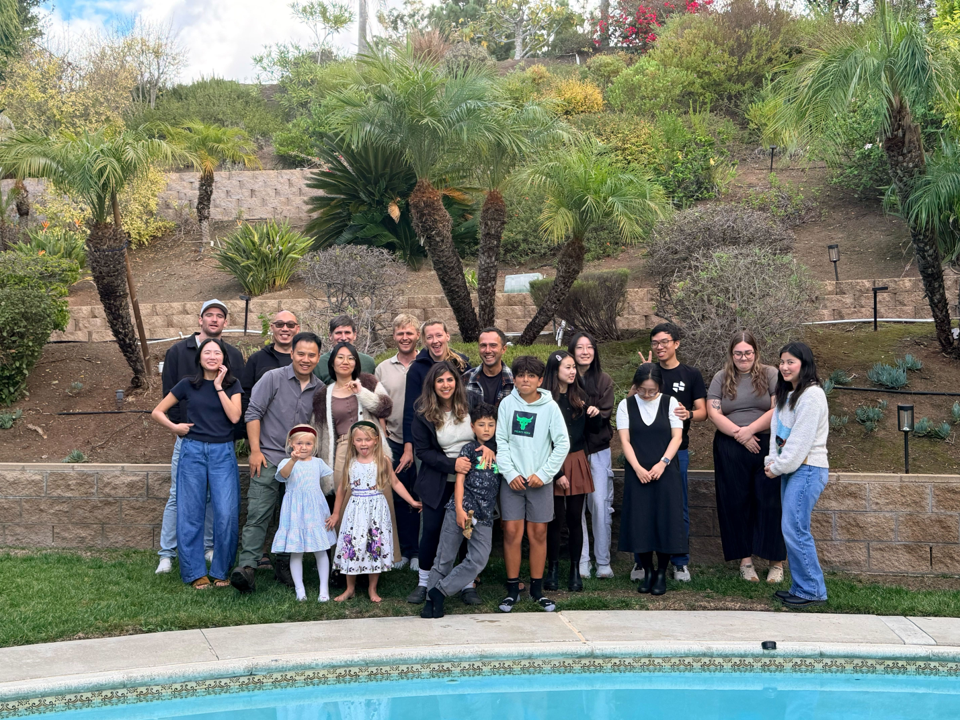
Maximilian Brambach completed his diploma thesis
Maximilian completed his diploma thesis as part of the HybridEcho team, drawing on his Industrial Engineering background to work at the intersection of technological assessment and economic evaluation. His research focused on the market and economic viability of continuous, non-invasive blood pressure monitoring using wearable ultrasound technology. As part of his thesis, he conducted an in-depth competitive analysis of both current and emerging blood pressure wearables to identify technical limitations and user acceptance barriers in the consumer market. He further quantified consumer preferences and willingness to pay through a choice-based conjoint study, integrating these insights into a Target Costing model tailored for early-stage medtech development.
Building on these findings, his work supports the transition from problem–solution fit to product–market fit and provides a valuable foundation for guiding future technological and economic decisions in the development of ultrasound-based wearables. He submitted his diploma thesis in November.
Semeco Review
On October 1st, our HybridEcho team had the opportunity to present our latest research progress as part of the SEMECO funding cluster review at Infineon Dresden. The SEMECO cluster brings together partners from medicine and microelectronics to foster innovation at the intersection of these fields. During the on-site evaluation, an expert jury assessed the ongoing projects within the cluster and their advancements. We were proud to showcase three live demonstrations highlighting our recent developments:
- Using our first hybrid array PCB, we demonstrated the functionality of our system in a water tank.
- For our upcoming WUMMS project on wearable ultrasound, we presented a distance measurement demo using air ultrasound, coded signals, and an ultra-low-power microcontroller (PSoC-6).
- Our partners from Bosch joined us with a demonstration of invasive blood pressure measurement using ultrasound, part of a newly initiated collaborative project.
The jury was very positive about our results and the progress made within the SEMECO framework.
In addition, Dr. Moritz Herzog emphasized in his presentation on the Clinicum Digitale the importance of close collaboration between the semiconductor industry and clinical research for the successful development of next-generation medical technologies.
We sincerely thank the jury and all participants for the inspiring discussions, as well as Infineon Dresden for hosting the event. Our gratitude also goes to Prof. Gerhard Fettweis, Prof. Jochen Hampe, and the EKFZ team for their excellent organization and support. Finally, a big thank-you to our HybridEcho group for their dedication and effort in preparing and presenting our current research achievements.
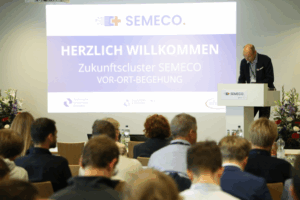
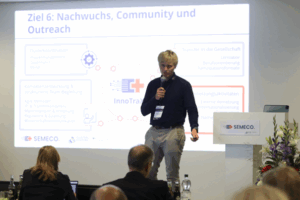
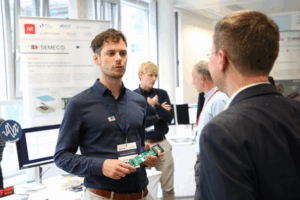
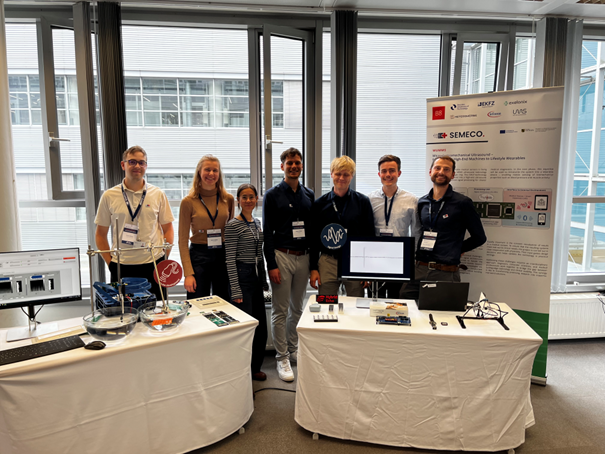
Erik Kaiser finishes Diploma Thesis
In September, Erik Kaiser successfully completed his diploma thesis as part of our team. His work investigated an ultrasound-based approach for blood pressure monitoring by tracking arterial dynamics, motivated by the fact that hypertension remains widely underdiagnosed and conventional measurements often provide only snapshots or depend on irregular at-home measurements.
Within his thesis, Erik demonstrated a proof of concept using our hybrid transducer technology and coded excitation to track arterial diameter changes in a porcine-artery ultrasound phantom. Building on these results, he discussed key considerations for bringing such methods closer to wearable use cases and outlined promising directions toward calibration-free ultrasound-based blood pressure monitoring. Overall, his work highlights the long-term potential of continuous, everyday blood pressure tracking and its ability to help reduce undiagnosed hypertension.
UltrasounDD Symposium in Dresden
This year’s Interdisciplinary Ultrasound Symposium (UltrasounDD) in Dresden was a great success! Last week, we welcomed over 100 participants from across Europe to explore “Advances, Applications and Future Perspectives in Medical Ultrasound Technology.”
The 2025 edition was co-chaired by Dr. Moritz Herzog (HybridEcho / EKFZ) and Prof. Christian Kupsch (MSE Lab, TU Freiberg), bringing fresh perspectives and a dynamic program.
The day featured inspiring keynotes, spotlight lectures on wearable ultrasound, and two interdisciplinary focus sessions that sparked new ideas for future collaborations and projects.
We were honoured to host speakers and participants from institutions such as ETH Zurich, University Eindhoven, IFW Dresden, ENAS Chemnitz, University Hospital Leipzig, IAVT Dresden, UKD Dresden, HS Coburg, Hochschule Merseburg, SRK-Klinikum Gera, and IWU Dresden, as well as from our industry partners Mindray Medical, US4US, Sonovum, iThera, Clarius and Infineon Dresden.
The discussions once again emphasized how much innovation thrives through interdisciplinary exchange – from high-end imaging and AI integration to wearable ultrasound systems.
A sincere thank-you to all speakers, exhibitors, and students who made this event possible, and to EKFZ for their support. We’re already looking forward to UltrasounDD 2026 and to continuing these inspiring collaborations!
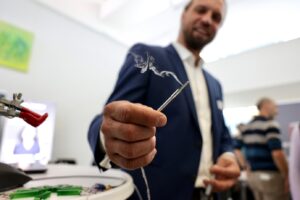
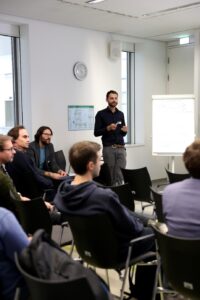
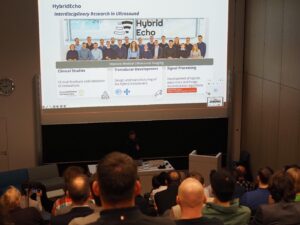
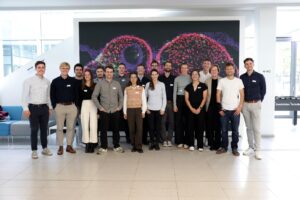

Visit ICU in Paderborn
HybridEcho contributes 5 talks at International Congress of Ultrasonics (ICU) in Paderborn
Part of the HybridEcho group set out to another conference in September. The prestigious International Congress of Ultrasonics (ICU) was held in Paderborn, Germany.
An impressive amount of 5 talks was accepted as lectures and we set out to present our latest findings there.
Just like the whole group, the topics covered were diverse and very interdisciplinary:
From laser micromachining of single crystal piezos, over CMUT transducer characterization and coded signals to clinical applications with Deep Learning in Quantitative Ultrasound and the presentation of a toolbox for quantitative ultrasound.
Thank you to the EMT Paderborn for hosting this congress.
It was a nice opportunity to catch up on latest research and to connect with old and new collaborators.
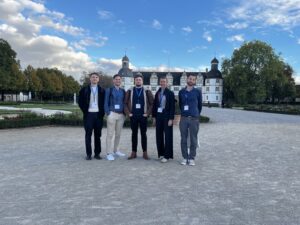
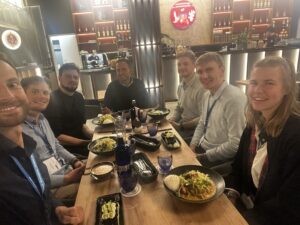
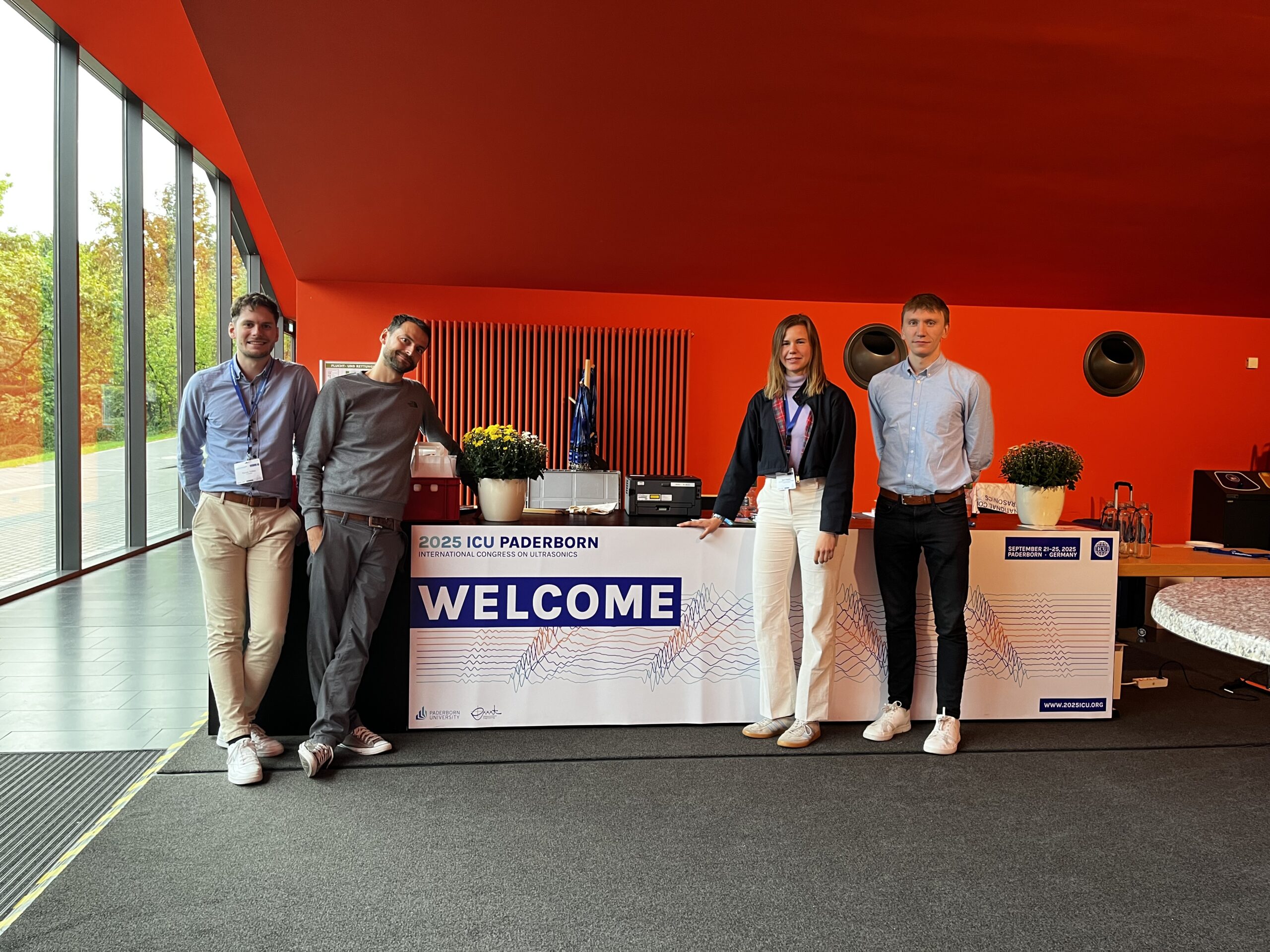
Visit “Viszeralmedizin 2025” in Leipzig
Immediately following the IEEE IUS conference, the medical members of our group attended the DGVS 2025, the annual congress of the German Society for Gastroenterology, Digestive and Metabolic Diseases, held in Leipzig.
At this distinguished event, we had the privilege of presenting our latest research findings in three accepted presentations showcasing our advances in quantitative ultrasound analysis. Furthermore there was a major talk by Dr. Moritz Herzog on plane-wave ultrasound imaging. The subsequent discussions were particularly insightful, providing valuable feedback and perspectives from a strong clinical and translational point of view.
Beyond the scientific sessions, the conference offered an excellent platform to exchange ideas with colleagues, reconnect with familiar faces, and establish new connections within the gastroenterology and medical imaging communities.
We would like to express our sincere gratitude to the DGVS for organizing such a well-structured and inspiring congress, and for fostering an environment that bridges innovative research and clinical application.
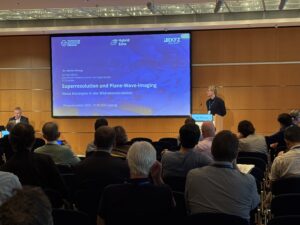
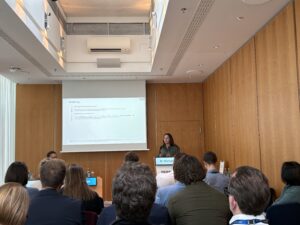
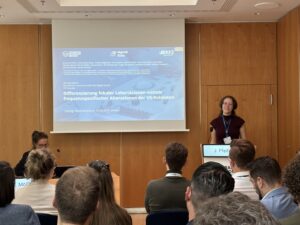
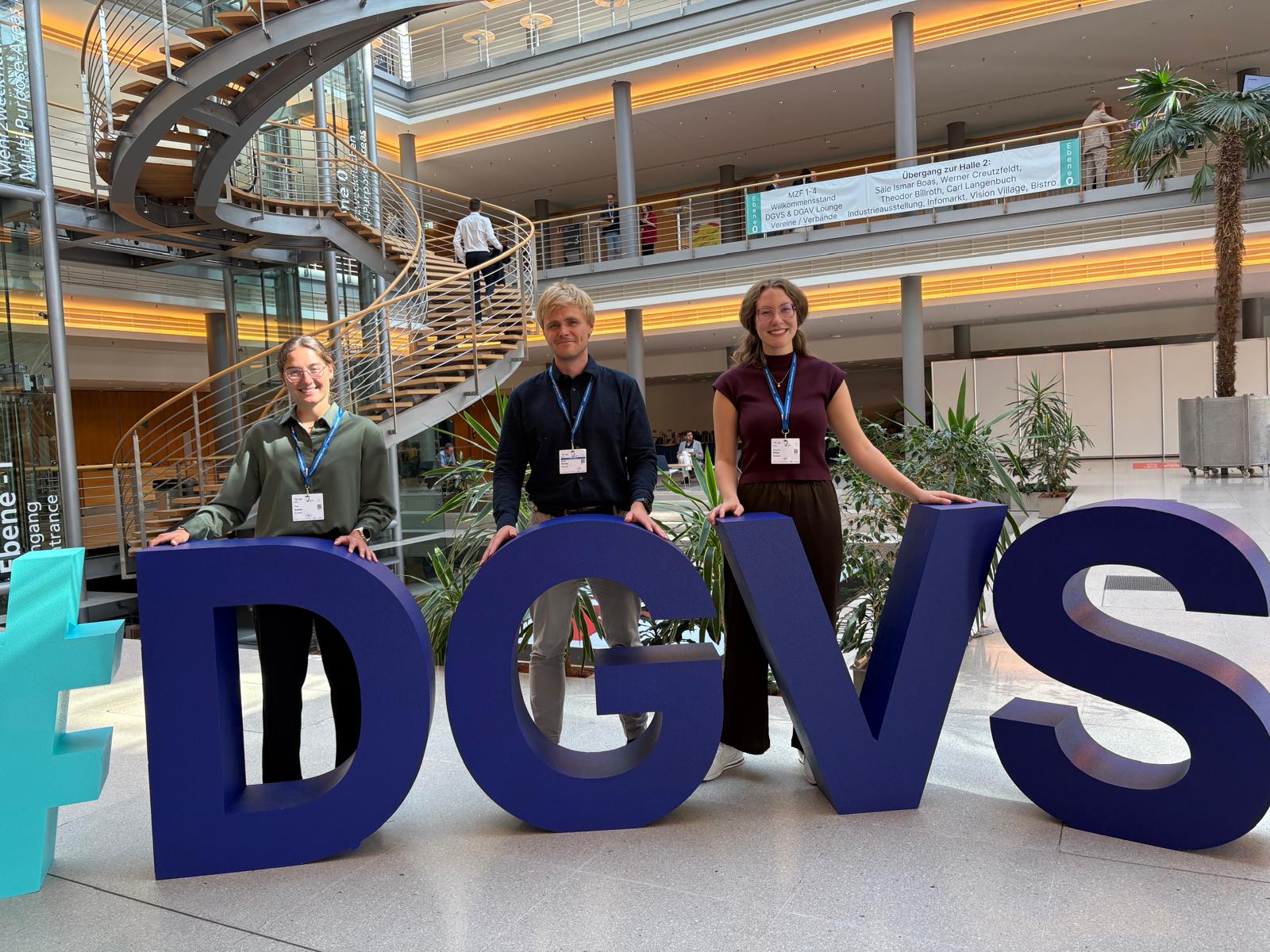
Visit IUS in Utrecht
The entire Hybrid Echo team attended the IEEE International Ultrasonics Symposium (IUS) to present our latest results to a broad audience of experts and industry representatives. Through lectures covering a wide range of ultrasound topics – from high-end hybrid array systems to wearable ultrasound devices – we fostered engaging discussions with companies and fellow research groups. Our posters also attracted considerable attention and sparked in-depth conversations on specialized topics.
The location in Utrecht, Netherlands, provided the perfect setting to combine scientific exchange with social networking. Evenings in the city offered plenty of opportunities to connect with colleagues from around the world, while mornings at our lakeside hotel started with a refreshing run and swim to recharge for the day.
We are deeply grateful to the organizers and to our team for making this event truly unforgettable.
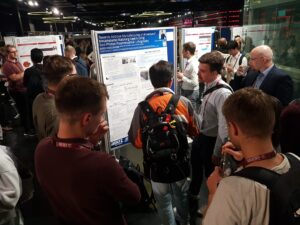
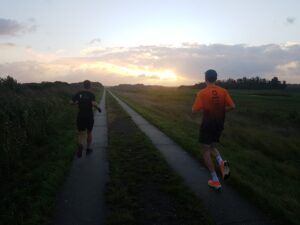
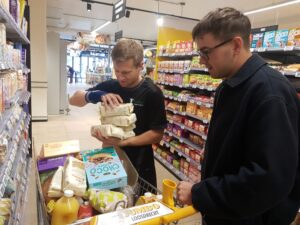
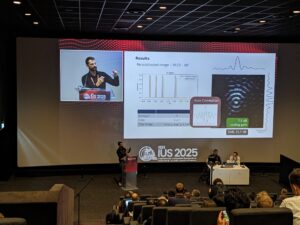
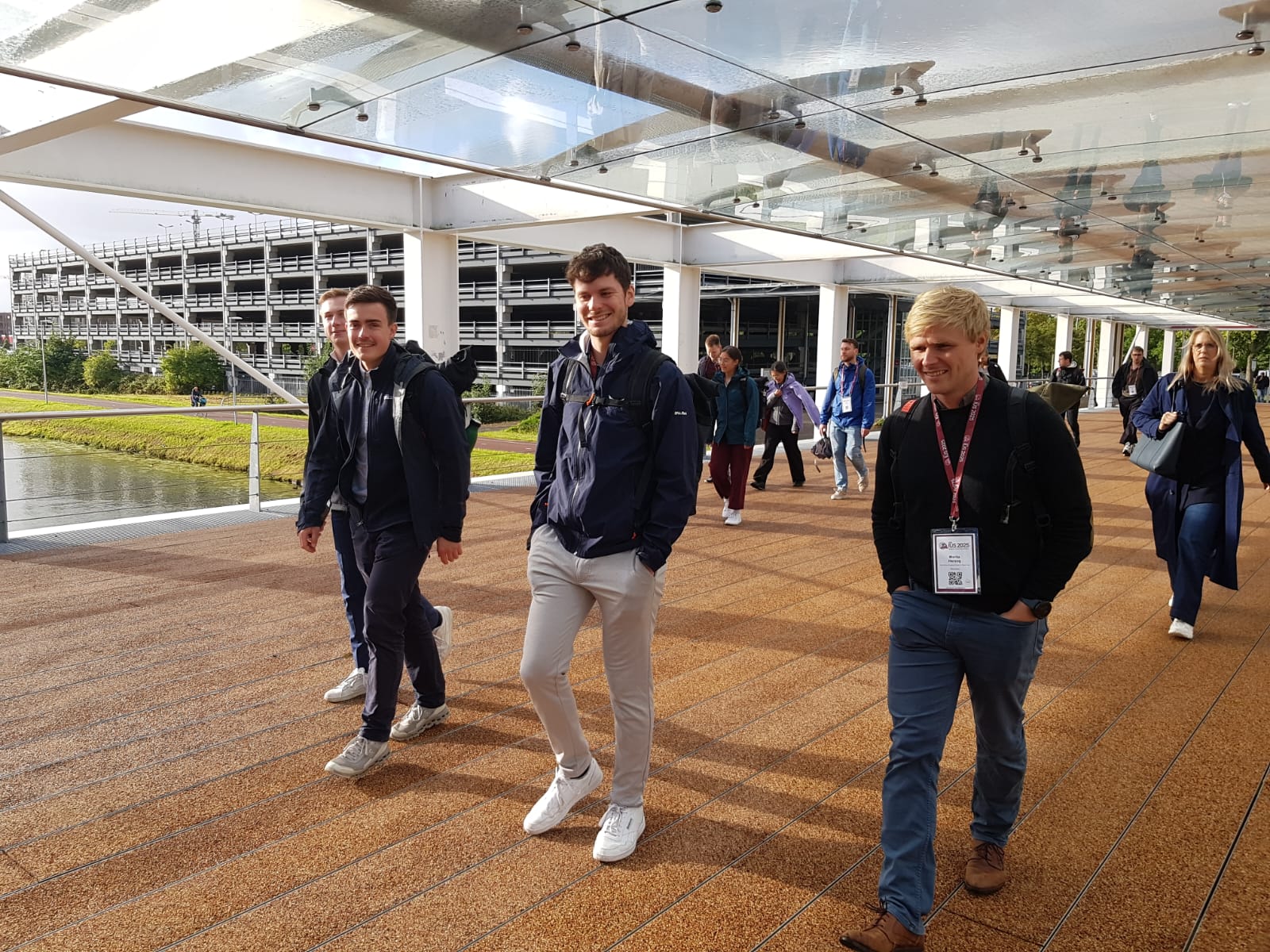
Visit BOSCH GmbH in Reutlingen
We visited ROBERT BOSCH GmbH in Reutlingen to learn about fascinating world of MEMS. We discussed use cases of MEMS for medical applications. The exchange provided valuable insights into Bosch’s expertise in MEMS design and manufacturing. It opened perspectives for future opportunities.
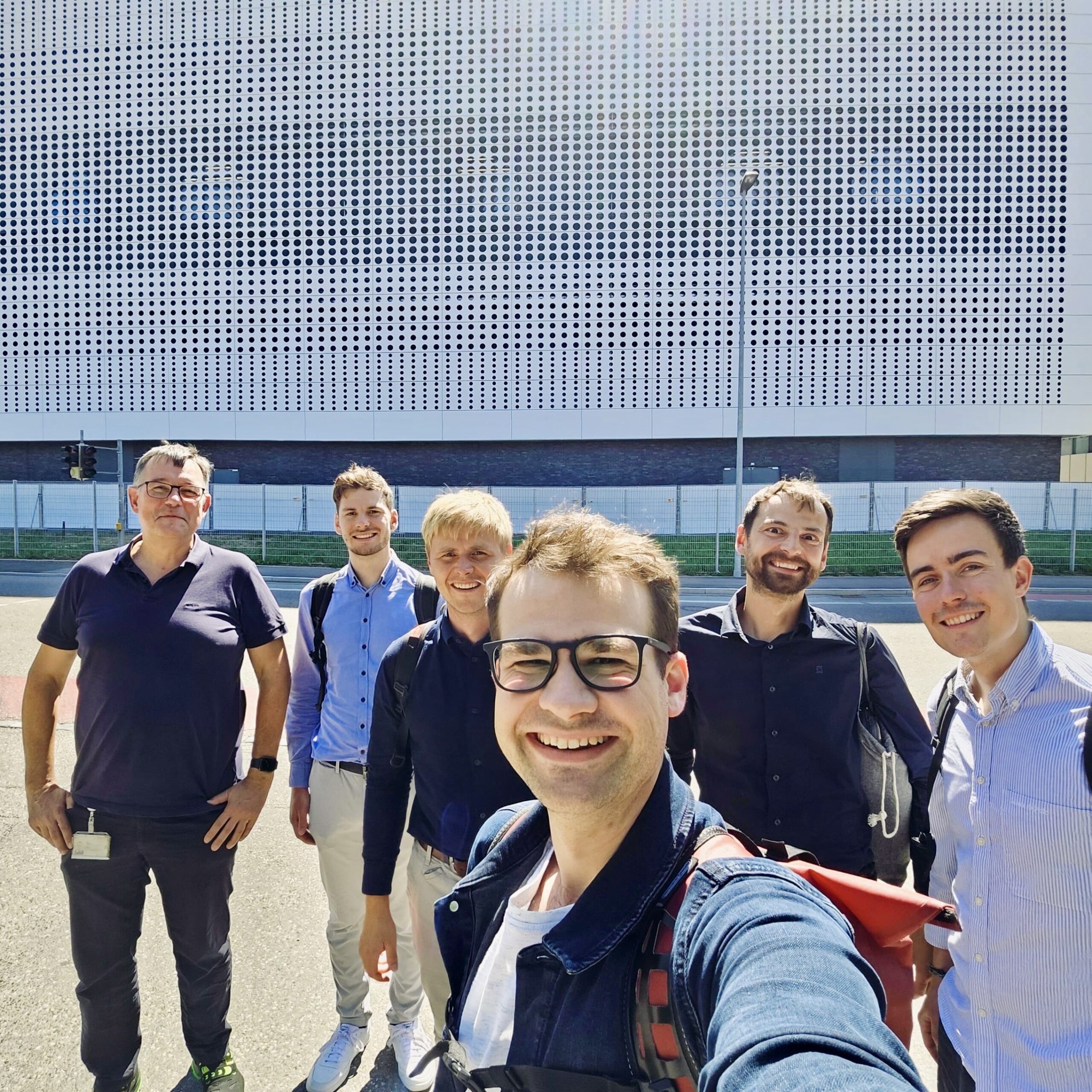
Dresden Science Night 2025
HybridEcho: Spotlight on the Future of Medical Ultrasound
This event invited several special guests including Jan Pratzka, mayor for Economic Affairs, Digital Affairs, Human Resources and Security, to take a closer look at several research activities across Dresden. The delegation of around 30 people visited the HybridEchoresearch group of Dr. Moritz Herzog at their booth at NCT Dresden. After a short introduction about the EKFZ for Digital Health and its research by Jakob N. Kather – Professor of Clinical AI – the visitors gained fascinating insights into innovations in medical ultrasound. In addition, they had the opportunity to try out the technology themselves and experience firsthand the need for improved image quality and more compact devices. The research team had prepared basins filled with gelatine, in which they embedded an egg, a lime and a banana. Visitors were given the opportunity to examine and puncture these items themselves using ultrasound. Afterwards, they got a short tour through the HybridEcho lab and had the chance to ask even more questions about their research. It was an exciting, valuable and enjoyable experience for both our researchers and our visitors.
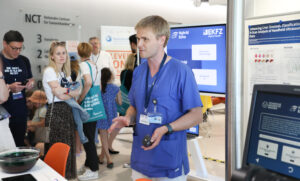
![]()
![]()
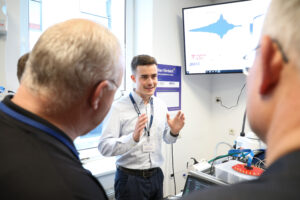
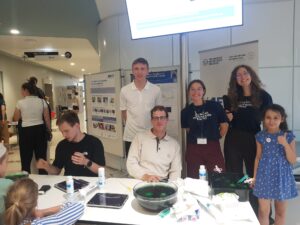
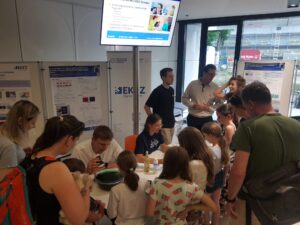
![]()
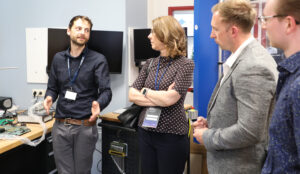
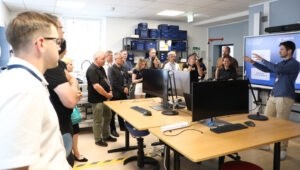
HybridEcho visits iThera medical Munich
HybridEcho at iThera Medical: Collaborative Research Exchange in Munich
In the first week of June, we at HybridEcho—part of the Else Kröner Fresenius Stiftung Research College— had the pleasure of visiting iThera Medical GmbH in Munich for a three-day collaborative exchange. Represented by Merit Städler and Julian Kober, our team engaged in insightful discussions with Antonia Longo and Marie Claye from iThera Medical. The focus of our exchange centered on shared technical challenges in receiver measurements—a key part of optimizing the receiving side of the imaging chain. Despite differences in our project applications, we quickly realized we are tackling many of the same issues. Together, we compared measurement strategies, defined parameters, and analyzed data acquisition workflows. A particular highlight was conducting joint measurements and evaluating the results side by side. Thanks to the iThera team for their warm hospitality, open collaboration, and the enriching exchange of ideas. We look forward to continuing this collaboration.
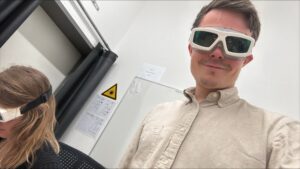
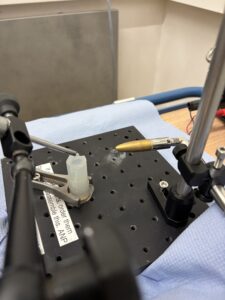
Artimino Conference on Medical Ultrasound in Lyon
HybridEcho at the Artimino Conference on Medical Ultrasound
We had the pleasure of attending the renowned Artimino Conference on Medical Ultrasound. Edgar Dorausch gave a talk on “A Combinatorial Approach for Optimizing Hybrid Sparse Arrays,” while Richard Nauber shared his work on “Real-Time Photoacoustic Imaging and Deep Learning-Based Tracking for Closed-Loop Control of Medical Microrobots” in collaboration with Prof. Mariana Medina-Sánchez (CIC nanoGUNE). We learned a lot, met many new people, and even had time to explore the beautiful city of Lyon. Thanks to the organizers for this great event – see you next time in Norway!
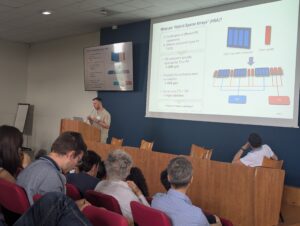
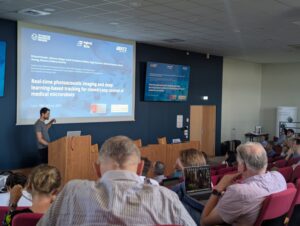
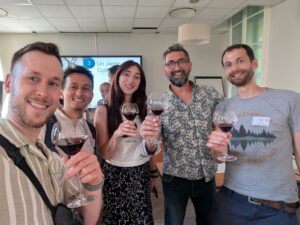
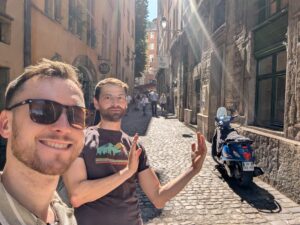
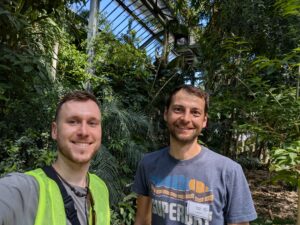
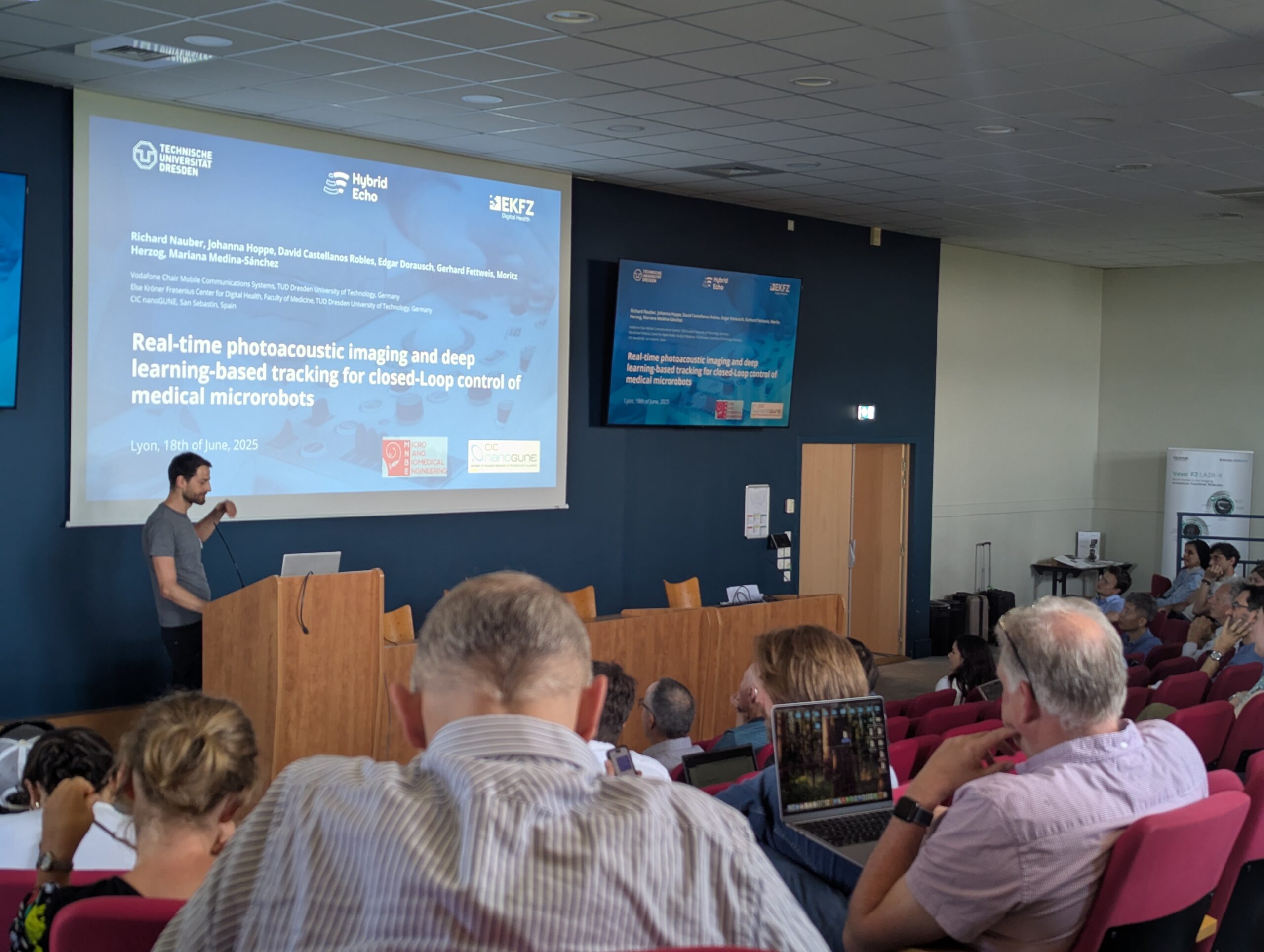
ISCOMS 2025 in Groningen
Johanna Pfeifer from the HybridEcho team recently attended the International Student Congress of (bio)Medical Sciences (ISCOMS) in Groningen – one of the world’s most renowned student congresses in the field of medicine. The event featured a rich program including hands-on workshops and a wide range of talks and discussions on topics such as gastrointestinal medicine, neurology, surgery, the use of artificial intelligence in healthcare and much more. Especially valuable was the exchange with fellow participants from around the world, as well as the insights shared by outstanding speakers. Johanna not only gained new perspectives for her work with HybridEcho, but also had the chance to present her current research results on ” Differentiation of Hepatocellular Carcinoma, Regenerative Nodules, and Cirrhotic Liver Tissue using Quantitative Ultrasound in affordable Handheld Ultrasound Devices” to an international audience 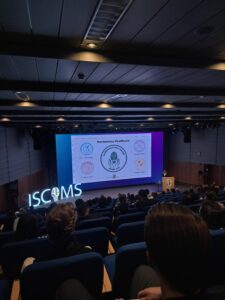
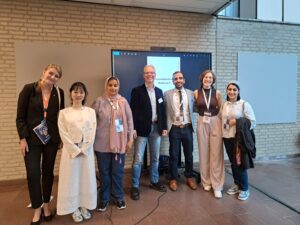
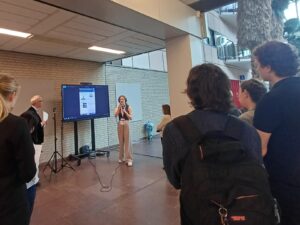
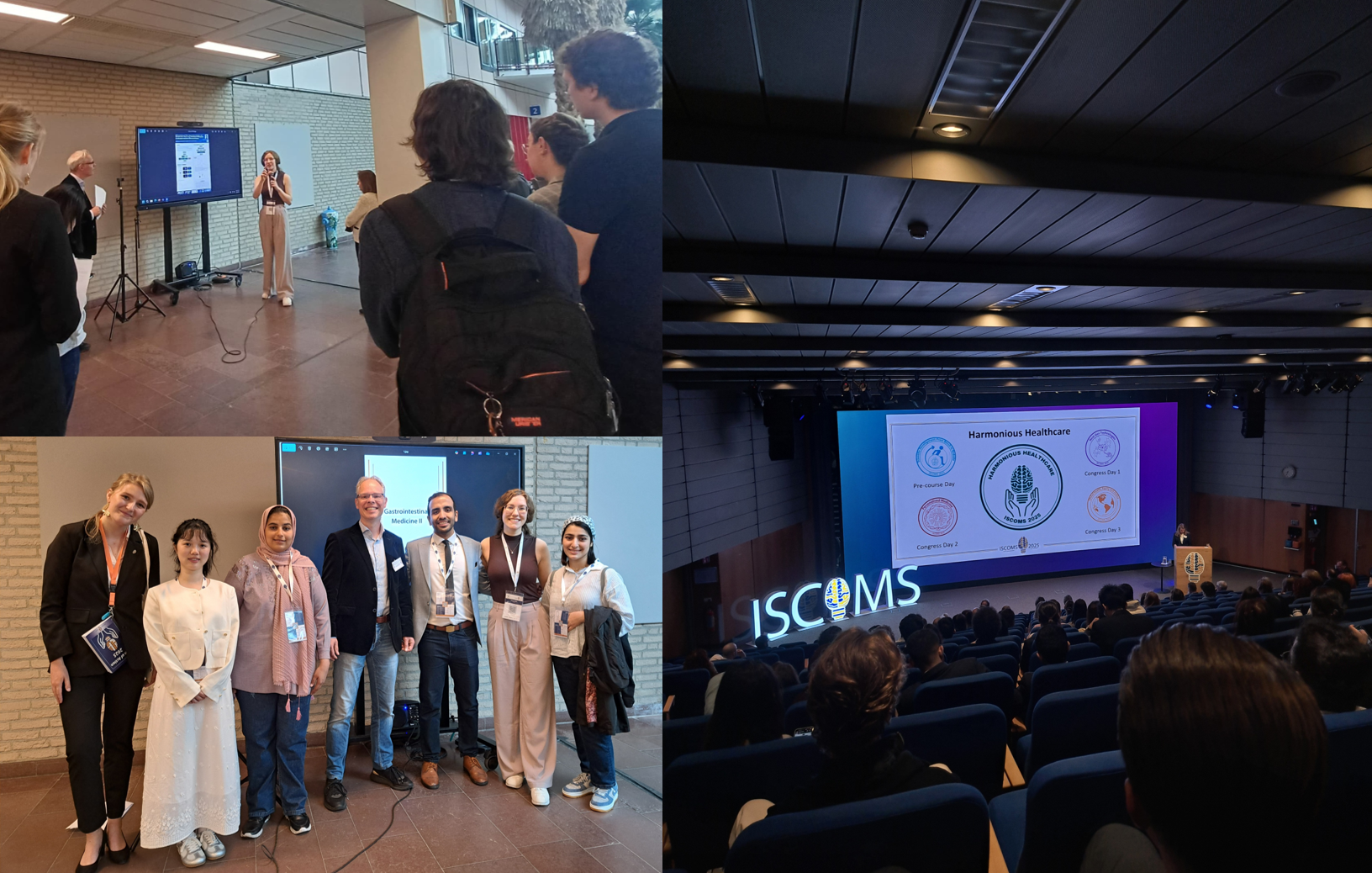
HybridEcho at the IEEE 6G Summit in Dresden
The HybridEcho team was proud to exhibit at the IEEE 6G Summit in Dresden – one of the leading platforms for future wireless communication technologies. Our presentation focused on the intersection of 6G innovation and medical technology, with a particular emphasis on ultrasound imaging. We showcased our latest developments and prototypes, demonstrating the potential of 6G for advanced medical applications. These achievements were made possible through the dedication and technical expertise of our team. Special thanks to everyone who played a key role in preparing and presenting our demo:
- Moritz Herzog
- Richard Nauber
- Cornelius Kühnöl
- Edgar Dorausch
- Pascal Stöver
- Franz Richter
- Mai Beckers
- Lisa Schurack
- Aswanth Thayyil
We look forward to further developing our work and actively contributing to the dialogue between telecommunications and medical technology. 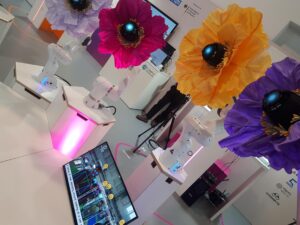
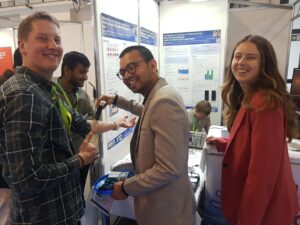
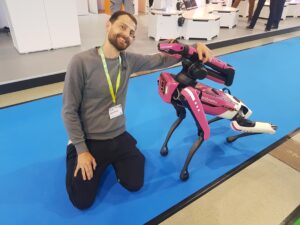
Clinicum Digitale 2025
From March 24, to April 2, 2025 over 50 students of medicine, engeneering and computer science dedicated themselves to current developments and challenges in medical technology. Together, the students not only gained insights into each other disciplines, but also developed startup ideas together and met real research groups. Many thanks to all the motivated participants! We look forward to seeing some of you again at the upcoming summer projects. 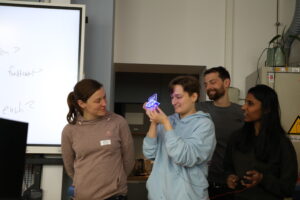
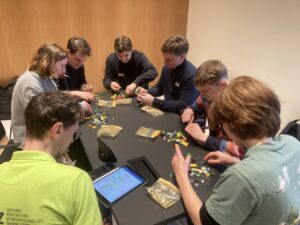
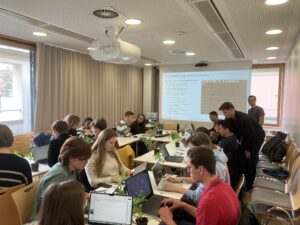
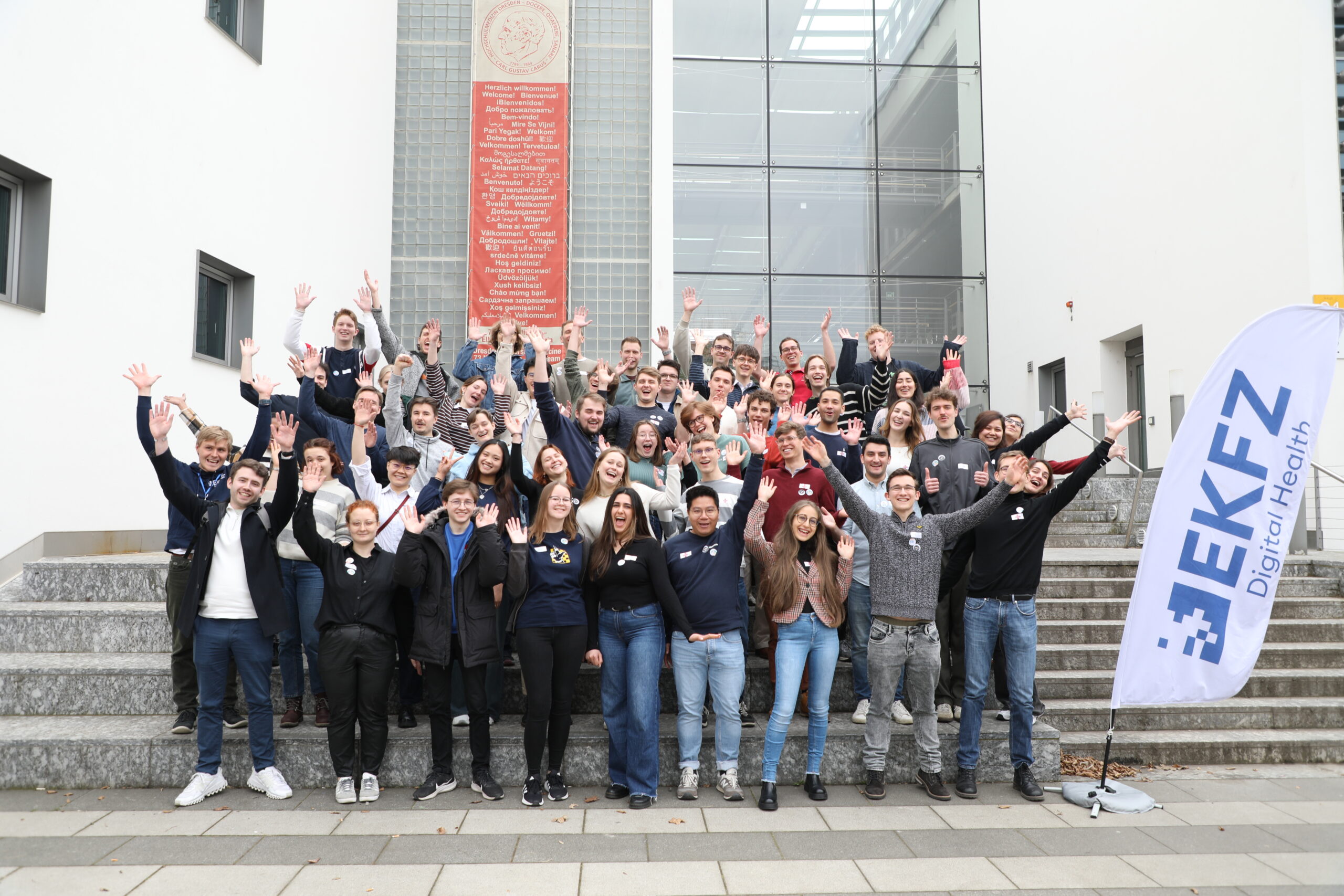
Miniaturized Ultrasonic Transducer With PMN-PT Embedded Into Flexible LCP Substrate for Biocompatible Applications
Air-coupled CMUTs beyond 2 MHz
Towards Additive Manufacturing of Broadband Metamaterial Matching Layers using Two-Photon Polymerization Lithography
Investigation of Real-Time Capabilities of the Qualcomm Snapdragon 8 for a Fourier-Based Imaging Algorithm
Deep Learning Reveals Liver MRI Features Associated With PNPLA3 I148M in Steatotic Liver Disease
Enhancing Liver Steatosis Classification: H-Scan Analysis of Handheld Ultrasound Data
Ultrasound Spectroscopy for the detection of inflammation in inflammatory bowel disease
2024 | UFFC Joint Symposium
Comparative Analysis of Mismatched Filtering Techniques: Cyclic vs. Non-Cyclic Approach
Read full article here
2024 | UFFC Joint Symposium
Characterization of Two-Photon Polymerization 3D Printing Materials for Acoustic Matching Layer and Lens Fabrication
2024 | Zeitschrift für Gastroenterologie
2024 | Zeitschrift für Gastroenterologie
2024 | European Journal of Ultrasound
2024 | European Journal of Ultrasound
2024 | Diagnostics
Prospective Comparison of Nine Different Handheld Ultrasound (HHUS) Devices by Ultrasound Experts with Regard to B-Scan Quality, Device Handling and Software in Abdominal Sonography; DOI:10.3390/diagnostics14171913
2024 | European Journal of Ultrasound
2023 | IEEE Proceedings of the IUS
Channel Sounding Approach Using Cyclic Zadoff-Chu Sequences for Ultrasound Imaging DOI: 10.1109/IUS51837.2023.10308374
2023 | IEEE Proceedings of the IUS
Enhanced Plane Wave Approximations of Spherical Waves for Fourier-based Synthetic Aperture Imaging DOI:10.1109/IUS51837.2023.10306696
2023 | EAI Proceedings of the MobiHealth 2023
Evanescent Wave Filtering for Ultrasound RF-Data Compression; DOI: 10.1007/978-3-031-60665-6_3
2023 | European Journal of Ultrasound
2023 | Zeitschrift für Gastroenterologie
2023 | SPIE Medical Imaging
2022 | Zeitschrift für Gastroenterologie
Who We Are
Group Leader
Group Members
Student Members
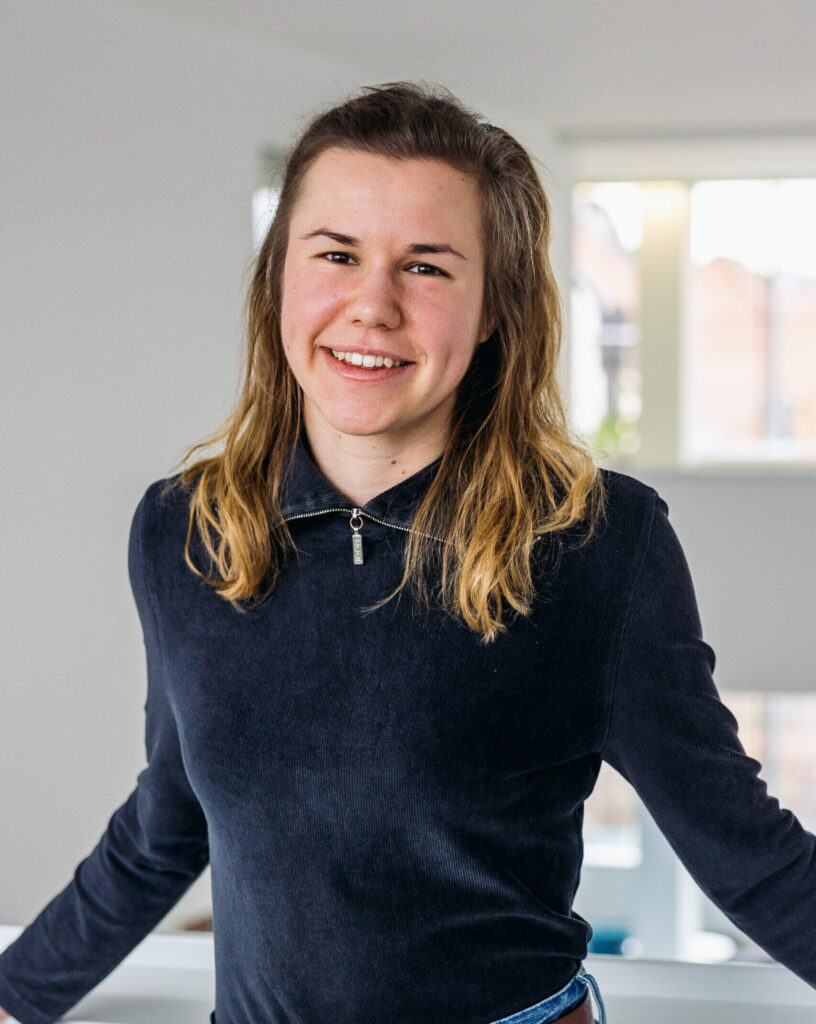
Merit Städler
Merit studied industrial engineering at TU Dresden. She has been a member of the HybridEcho team since 2024. For her thesis, she investigated methods for characterizing the behavior of CMUTs. She successfully defended her thesis in November 2025.
Thesis Students
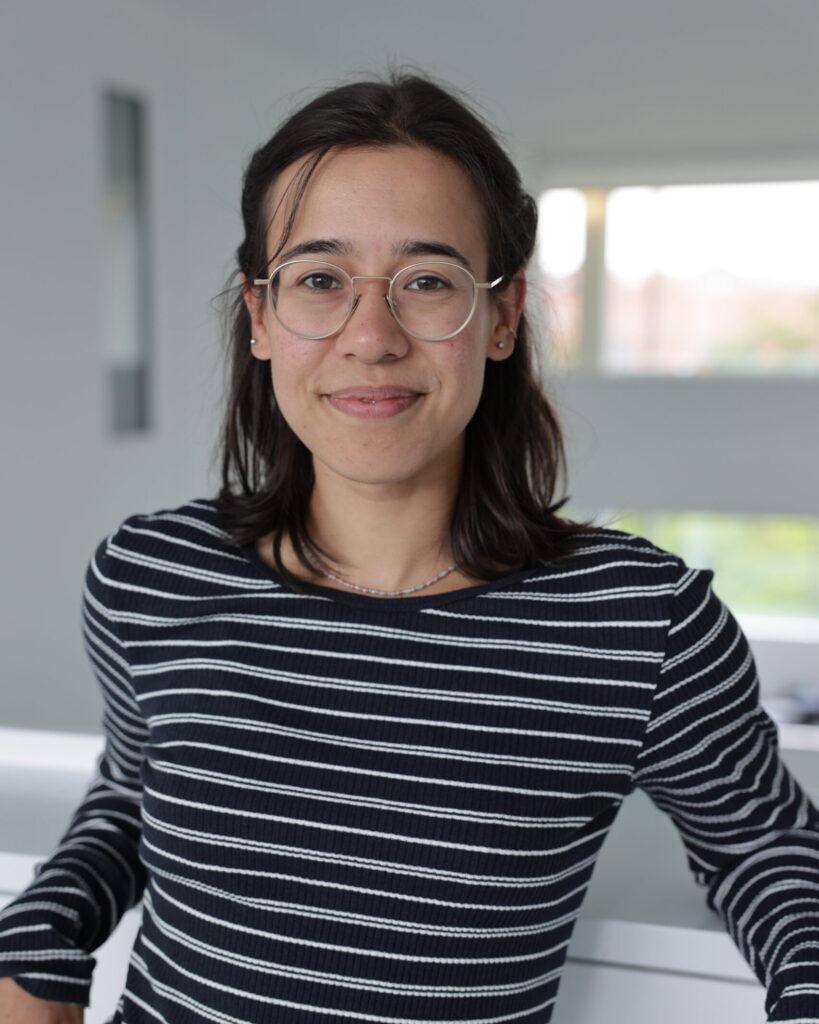
Nele Kirsch
Nele studies Electrical Engineering at the TU Dresden. She joined the HybridEcho group in 2025 for her diploma thesis focusing on digital signal processing and analog-to-digital conversion. She is particularly interested in developing efficient real-time algorithms for high-speed data acquisition in embedded systems.
Patronage
HybridEcho offers positions for undergraduate and postgraduate students from various backgrounds. To learn more, join us for a lunch meeting, apply for an internship, or send an unsolicited application. If you are interested, please contact alexa.sieghardt@tu-dresden.de.
As thesis student you are fully integrated into the group benefiting from:
- biweekly Jour Fixe with your supervisor plus weekly meetings in your core team
- Introduction into agile project management
- Publication opportunities as first author in journals and at conferences
- Industry collaborations with established companies and startups
Medicine
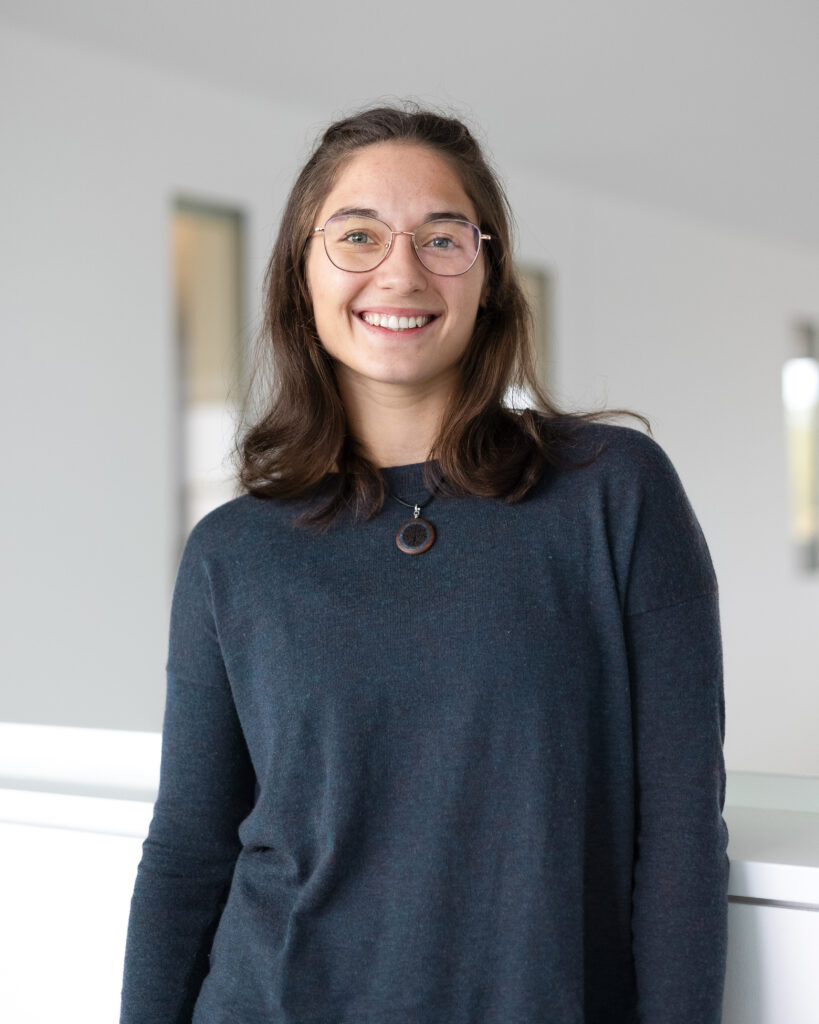
Tina Gabriel
Tina Gabriel joined the HybridEcho group in 2023 for her medical thesis on analyzing of raw ultrasound data of diffuse liver disease. In May 2025, she successfully defended her thesis with summa cum laude. Following her disputation, she continues to support the HybridEcho team, focusing on raw data analysis and the implementation of clinical studies alongside her ongoing medical studies at the University Hospital in Dresden.
Ultrasound imaging is a widely used diagnostic tool for liver diseases, yet conventional B-mode imaging has limitations in detecting diffuse liver pathologies at early stages. This dissertation explores the application of H-Scan analysis on handheld ultrasound (HH-US) radiofrequency (RF) data to assess diffuse liver diseases, particularly liver steatosis. The study evaluates the feasibility of H-Scan scatter ratio as a quantitative imaging biomarker, comparing results with controlled attenuation parameter (CAP) values obtained from transient elastography (FibroScan®).
Using a large patient cohort, RF data were recorded with high-frequency linear and low-frequency abdominal HH-US probes. The study demonstrates that the H-Scan scatter ratio significantly differentiates between patients with severe steatosis (S3) and those without steatosis (S0). Furthermore, a strong correlation between scatter ratio and CAP values was observed. These findings suggest that quantitative H-Scan analysis, integrated with portable ultrasound devices, could enhance early-stage liver disease diagnostics and offer a cost-effective alternative to conventional elastography techniques.
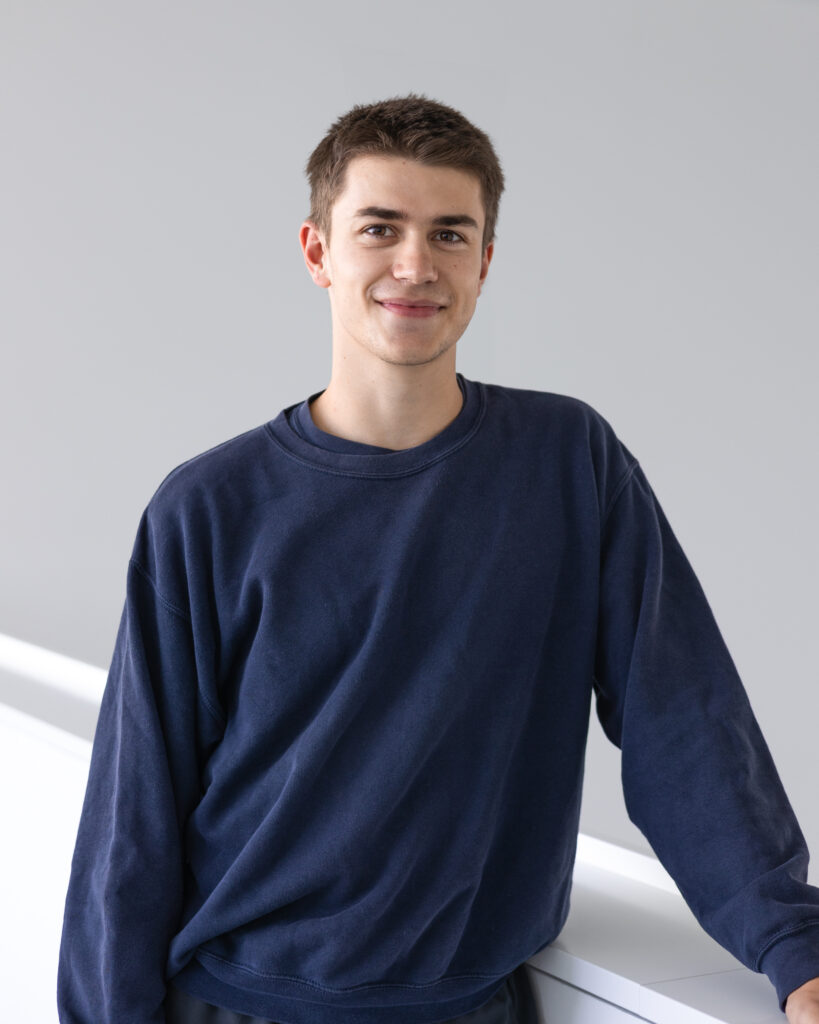
Jakob Schäfer
Jakob joined the HybridEcho team after attending the Clinicum Digitale for his medical thesis on the analysis of raw ultrasound data from the liver as part of his initial studies. In October 2024 he passed his thesis with summa cum laude and is now continuing to study medicine at the University of Halle.
Chronic liver diseases affect ~1.5 billion people worldwide and cause 3.5% of all deaths. Hepatic steatosis can progress to irreversible damage, making early detection crucial. Non-invasive assessment has been challenging, but quantitative ultrasound-based methods are gaining importance. This study aimed to develop a quantitative ultrasound parameter to assess liver steatosis using transient elastography’s controlled attenuation parameter (CAP) as a reference. Raw ultrasound radiofrequency (RF) data from handheld devices were analyzed. The main hypothesis proposed a strong correlation between ultrasound attenuation recorded with a handheld linear transducer and CAP values. Between November 2022 and March 2023, raw ultrasound data were collected from patients undergoing ultrasound and Fibroscan examinations using Clarius C3HD3 and L15HD3 transducers. Three-second recordings were processed using a Python script. A non-frequency-specific attenuation parameter (AP) and a frequency-specific AP were calculated via short-time Fast Fourier Transformation (stFFT). Pearson and Spearman correlation coefficients were determined, and Fishers-z tests compared correlations. Data from 135 participants were analyzed. Pearson correlation coefficients between non-frequency-specific AP and CAP were 0.634 (C3) and 0.694 (L15). For frequency-specific AP, correlations were 0.693 (C3) and 0.712 (L15). The correlation between frequency-specific AP and CAP was not significantly higher than that of non-frequency-specific AP. Strong correlations between ultrasound APs and CAP values suggest handheld ultrasound devices can quantify liver steatosis. However, frequency-specific APs require further investigation. Validation with MRI-PDFF is recommended.
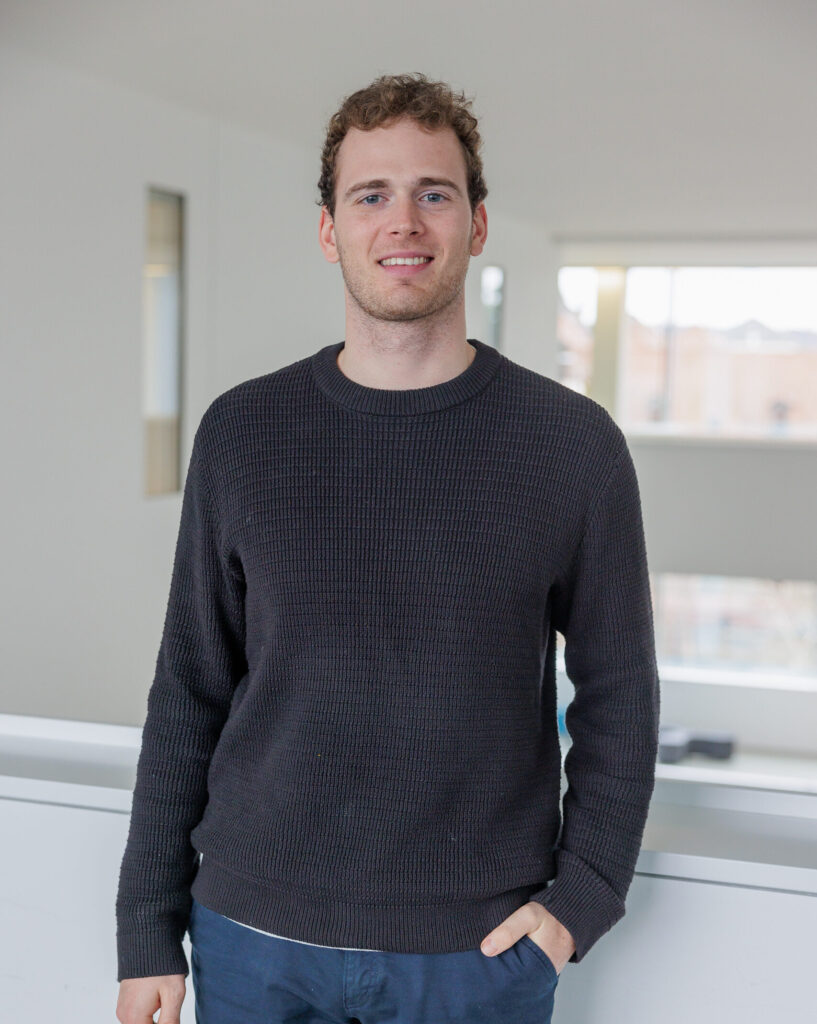
Tobias Gohlke
Tobias Gohlke joined the HybridEcho research group in 2024 after completing his studies at the Clinicum Digitale to write his diploma thesis. He investigated the potential of wearable ultrasound patches for the continuous monitoring of vital signs. In September 2025, he completed his studies in industrial engineering with a focus on biomedical engineering at TU Dresden.
Kardiovaskuläre Erkrankungen zählen weltweit zu den führenden Ursachen für Morbidität und Mortalität, wobei Hypertonie einen zentralen Risikofaktor darstellt [1]. Vor diesem Hintergrund gewinnt die kontinuierliche, nicht-invasive Blutdrucküberwachung zunehmend an klinischer Relevanz, insbesondere bei chronischen Verläufen und instabilen Kreislaufsituationen. Ziel dieser Untersuchung war es, das klinische Potenzial sowie die technologische Machbarkeit eines innovativen Blutdruckmesssystems auf Basis tragbarer Ultraschall-Patches systematisch zu analysieren und experimentell zu validieren. Dabei wurde ein hybrider Ansatz untersucht, bei dem piezoelektrische Sender mit kapazitiv mikromechanischen Ultraschallsensoren (CMUTs) kombiniert wurden.
Methodisch gliedert sich die Arbeit in eine sekundäre und eine primäre Forschung. Im Rahmen der Primärforschung wurden sowohl quantitative als auch qualitative Daten erhoben. Die quantitative Datenerhebung erfolgte über eine standardisierte Online-Umfrage (n = 41), ergänzt durch leitfadengestützte qualitative Interviews mit medizinischem Fachpersonal. Die Ergebnisse der quantitativen Befragung unterstreichen den dringenden klinischen Bedarf nach kontinuierlichen und zuverlässigen Blutdruckmonitoring-Systemen, wobei 76 % der Befragten die kontinuierliche Datenerhebung als diagnostisch besonders wertvoll einschätzen. Als zentrale Anforderungen wurden von 80,5 % der Befragten eine hohe Messgenauigkeit sowie von 70,7 % eine einfache Handhabung („Usability“) angegeben. Diese Aspekte wurden durch qualitative Interviews bestätigt, wobei insbesondere Pflegekräfte eine deutliche Entlastung im Klinikalltag erwarten.
Die systematische Literaturrecherche bestätigt deutliche methodische Limitationen etablierter Technologien zur nicht-invasiven Blutdruckmessung. Manschettenbasierte Verfahren weisen eine mangelnde Eignung für kontinuierliche Messungen auf und führen bei Patienten häufig zu Komfortproblemen [2]. Photoplethysmographische Methoden (PPG) erfordern regelmäßige Kalibrierungen, zeigen eine hohe Anfälligkeit gegenüber Störgrößen und haben stark schwankende Zuverlässigkeiten [3]. Auch tonometrische Verfahren, welche prinzipiell zur kontinuierlichen Messung geeignet sind, weisen aufgrund ihrer komplexen Positionierung Einschränkungen im Klinikalltag auf [4]. Demgegenüber bieten ultraschallbasierte Verfahren, die auf physiologischen Parametern wie der lokalen Pulswellengeschwindigkeit und dynamischen Gefäßdurchmesseränderungen basieren, deutliche Vorteile: Sie ermöglichen eine kalibrierfreie Blutdruckbestimmung, sind weniger anfällig gegenüber Bewegungsartefakten, liefern eine höhere Messgenauigkeit und gewährleisten einen höheren Patientenkomfort durch den Verzicht auf Manschetten [5].
Die Genauigkeit der ultraschallbasierten Blutdruckbestimmung hängt maßgeblich von der zuverlässigen Detektion arterieller Durchmesseränderungen ab, was eine hohe Signalqualität voraussetzt. Vor diesem Hintergrund wurde im experimentellen Teil die Eignung frequenzmodulierter Chirp-Signale im Vergleich zu konventionellen Pulsen untersucht, sowohl im synthetischen Modell als auch an einer ex vivo Schweinearterie. Bewertet wurden axiale Auflösung (FWHM), peak-basiertes Signal-Rausch-Verhältnis (SNR) und die Detektionsstabilität reflektierter Strukturen über jeweils 50 Einzelmessungen. Im synthetischen Modell reduzierte sich die FWHM der vorderen Wandstruktur von 2.26 mm (Puls) auf 0.372 mm (Chirp, SD: 6.9 µm), was einer Reduktion um 83.5 % entspricht. Die hintere Wand war unter Pulsanregung nicht detektierbar, konnte jedoch mit Chirp-Signalen zuverlässig erfasst werden (FWHM: 0.370 mm). Das SNR stieg von 21,62 dB auf 33,27 dB (SD: ±0,007 dB), was einer Steigerung um rund 54 % entspricht. Die Peakposition beim synthetischen Versuchsaufbau mittels Chirp wies eine Standardabweichung von 87.38 µm auf. Im biologischen Modell ermöglichte das auf Chirpsignalen basierende Verfahren eine klare Abgrenzung beider Arterienwände, einschließlich der Detektion innerer und äußerer Wandschichten. Die FWHM betrug 0.72 mm (vorn) und 0.87 mm (hinten), das SNR 21.42 dB bzw. 16.44 dB. Die Positionsstreuung lag bei ±92.45 µm. Eine quantitative Auswertung war unter Pulsanregung aufgrund unzureichender Signalqualität nicht möglich. Die Ergebnisse belegen eine Verbesserung aller Zielparameter: Die Reduktion der FWHM um bis zu 84 %, die Steigerung des SNR und die hohe Reproduzierbarkeit der Peakposition unterstreichen die diagnostische Eignung frequenzmodulierter Chirp-Signale für hochauflösende, kontinuierliche Ultraschallmessungen in komplexem Gewebe.
Die Ergebnisse dieser Arbeit unterstreichen somit die technische Realisierbarkeit und klinische Attraktivität eines ultraschallbasierten Ansatzes zur kontinuierlichen Blutdruckmessung. Trotz methodischen Vorteilen bleiben jedoch weitere Schritte zur Miniaturisierung, Echtzeit-Signalverarbeitung sowie die Erfüllung regulatorischer Anforderungen gemäß ISO 81060-2 wesentliche Herausforderungen. Zukünftige Forschungsarbeiten sollten sich daher auf die klinische Validierung unter Realbedingungen sowie auf die Integration der Technologie in bestehende klinische und ambulante Versorgungsstrukturen konzentrieren, um den identifizierten Bedarf effektiv zu adressieren und die Patientenversorgung nachhaltig zu verbessern.
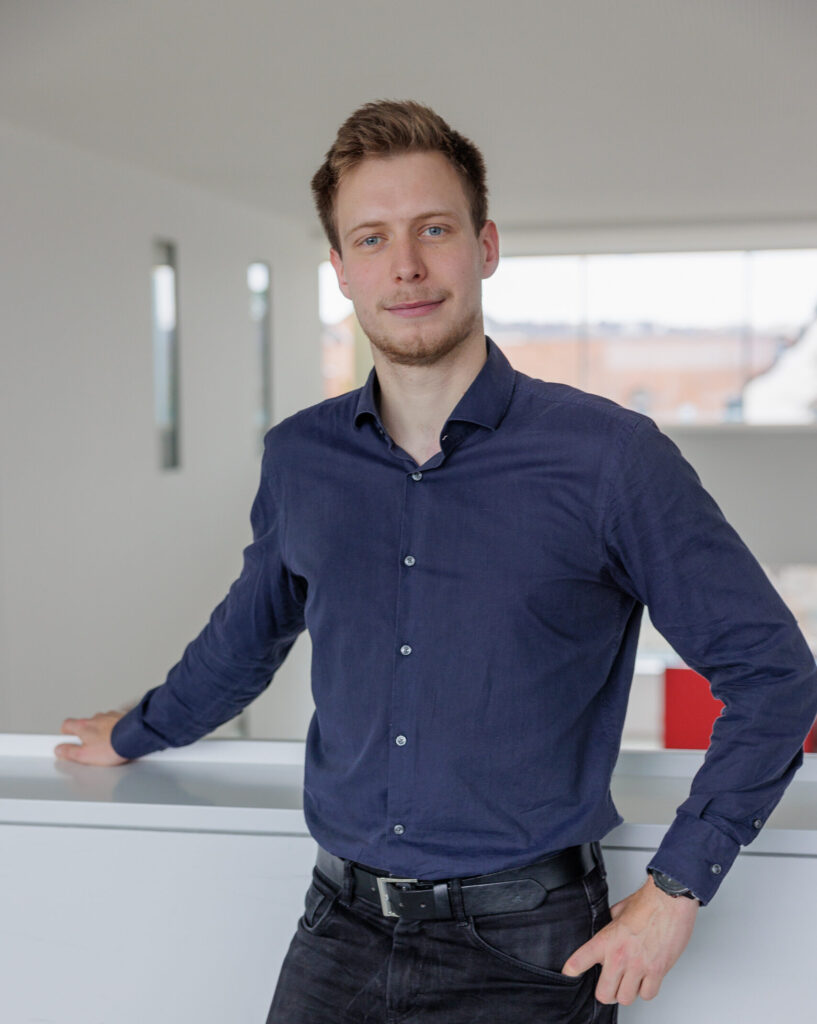
Erik Kaiser
Erik completed his studies in Industrial Engineering at TU Dresden, majoring in Electrical Engineering and Finance. In January 2025, he joined the HybridEcho team to conduct his research and diploma thesis on wearable ultrasound devices. His research focused on exploring their technological potential and clinical applications. As a Ph.D. candidate, Erik continues to investigate wearable ultrasound systems, with a focus on continuous blood pressure and muscle monitoring.
Hypertonie zählt weltweit zu den führenden Ursachen kardiovaskulärer Mortalität, bleibt jedoch häufig unerkannt. Mehr als die Hälfte der Betroffenen ist nicht diagnostiziert, was jährlich zu Millionen vermeidbaren Todesfällen führt. Ein wesentlicher Grund hierfür liegt in den Limitierungen konventioneller Blutdruckmessmethoden, die entweder nur Momentaufnahmen liefern oder eine geringe Messbereitschaft im häuslichen Umfeld aufweisen. Die Integration der Blutdruckmessung in Smartwatches bietet daher ein erhebliches Potenzial, bestehende Barrieren zu überwinden. Die Nutzung von Ultraschallsensoren eignet sich hierfür besonders, da sich so biomechanische Parameter der Arterie erfassen lassen und Ultraschall aufgrund zunehmender Miniaturisierung für tragbare Anwendungen verfügbar wird.
Zur Umsetzung einer tragbaren Ultraschalllösung spielt dabei die axiale Auflösung und das mit begrenzten Energieressourcen erreichte Signal-to-Noise-Ratio eine zentrale Rolle. Durch die Kombination piezoelektrischer Sender mit Capacitive Micromachined Ultrasonic Transducern als Empfänger und den Einsatz langer, frequenzmodulierter Chirp-Signale lassen sich beide Parameter im Vergleich zu herkömmlichen Architekturen deutlich verbessern. Mit einem solchen Setup wird in dieser Arbeit erstmalig ein Proof of Concept erbracht, welcher zeigt, dass sich in einem Gewebephantom mit eingebrachter ex-vivo-Schweinearterie systolische und diastolische Durchmesser bestimmen lassen. Aus diesen lässt sich nach initialer Kalibrierung der Blutdruck berechnen.
Die Genauigkeit der Durchmesser-basierten Blutdruckbestimmung wird zusätzlich in zwei Messkampagnen evaluiert. Dabei wurden die Arteriendurchmesser mit einem High-End-Ultraschallgerät erfasst und die daraus berechneten Blutdruckwerte mit Referenzmessungen verglichen. Während die regulatorisch geforderte Standardabweichung (< 8 mmHg) eingehalten wird, überschreiten die mittleren systolischen Abweichungen in beiden Kampagnen (8,6 mmHg und 5,5 mmHg) den zulässigen Grenzwert (< 5 mmHg). Ergänzend zu dieser kalibrierungspflichtigen Methode wurden vier Ansätze identifiziert, die eine vollständig kalibrierungsfreie Blutdruckmessung mittels Ultraschalls ermöglichen. Damit wird sowohl die technische Machbarkeit des hybriden Ultraschallansatzes mit Chirp-Signalen in dieser Arbeit belegt als auch dessen Potenzial für eine zukünftige, kalibrierungsfreie und kontinuierliche Blutdruckmessung in Smartwatches aufgezeigt.
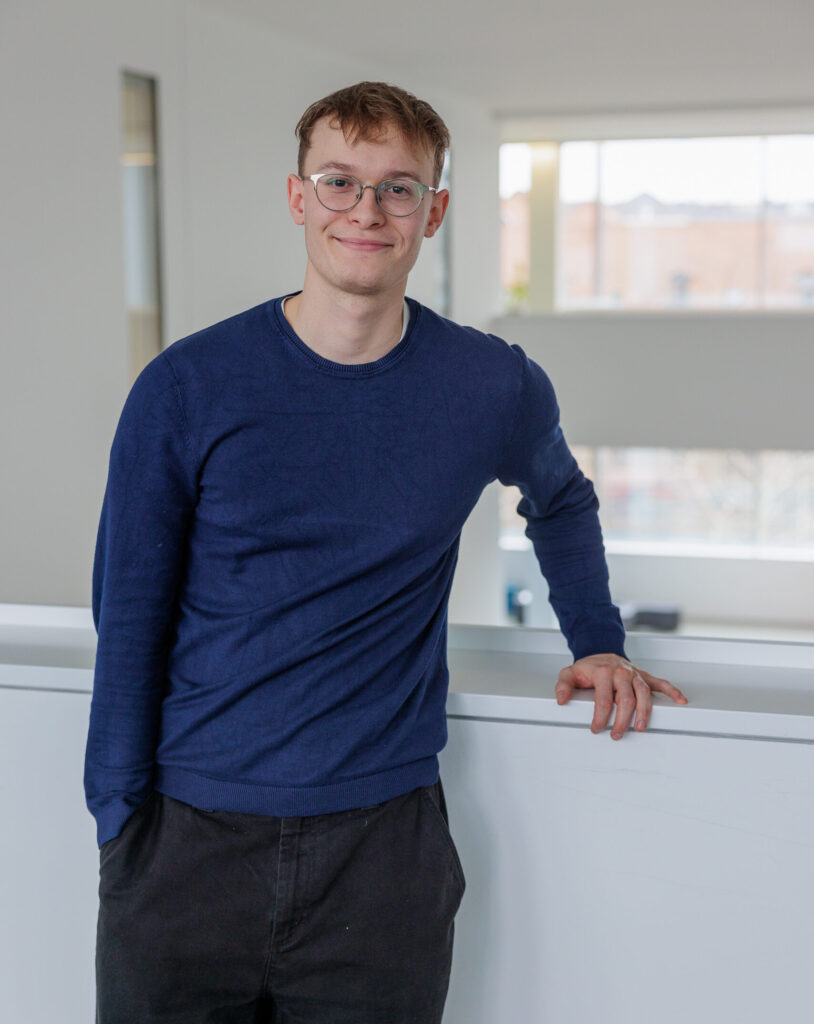
Maximilian Brambach
Maximilian is studying Industrial Engineering at TU Dresden, specializing in Biomedical Engineering and Finance. In 2024, he joined the HybridEcho team after participating in Clinicum Digitale to conduct his research and diploma thesis. His initial work focused on market perspectives and the procurement processes of high-end ultrasound systems. He later shifted his research toward wearable ultrasound devices, with a particular emphasis on their application for blood pressure monitoring in the consumer market. As part of his diploma thesis, he carried out a comprehensive competitive analysis and developed a Target Costing model for this application.
Ziel der vorliegenden Arbeit ist die systematische Untersuchung der Markt-, Nutzer- und Kostenstruktur eines kontinuierlich nicht-invasiven Blutdruckmessarmbands (cNIBP-Wearable), um auf dieser Grundlage eine strategische Bewertung seiner wirtschaftlichen Realisierbarkeit vorzunehmen und den Übergang vom Problem-Solution Fit zum Product-Market Fit (PMF) zu unterstützen. Methodisch kombiniert die Arbeit eine technologieorientierte Wettbewerbsanalyse und Nutzerbefragung zur Identifikation technischer Defizite und Akzeptanzbarrieren bestehender Blutdruck-Wearables mit einem ökonomischen Bewertungsansatz. Die Nutzwertpräferenzen potenzieller Endkunden werden mittels eines Choice-Based-Conjoint-Ansatzes ermittelt, während die Zahlungsbereitschaft auf Basis eines Vergleichs mit bestehenden Marktprodukten bestimmt wird. Beide Ergebnisse fließen in ein frühphasiges Target-Costing-Modell ein, das zur ökonomischen Bewertung und Kostensteuerung des cNIBP-Wearables dient. Die Untersuchung zeigt, dass bestehende Blutdruck-Wearables bisher keine kontinuierliche, kalibrierungsfreie und alltagstaugliche Messung ermöglichen und deutliche Defizite in Genauigkeit,
Komfort und Nutzerfreundlichkeit aufweisen. Auf Grundlage der ermittelten Zahlungsbereitschaft von 176 EUR und einer Zielrendite von 20 % wird ein Zielkostenrahmen von 70 EUR abgeleitet. Obwohl die aktuellen drifting costs (Ist-Kosten) noch über den allowable costs liegen, bietet das entwickelte Modell eine fundierte Basis für die technologische und ökonomische Optimierung und trägt somit wesentlich zur Erreichung des PMF bei.
Insgesamt verdeutlichen die Ergebnisse, dass Target Costing ein geeignetes Instrument zur Integration von Markt- und Kostenperspektive in der Frühphase innovationsgetriebener Medizintechnikentwicklung darstellt und damit die wirtschaftlich orientierte Produktgestaltung des cNIBP-Wearables wesentlich unterstützen kann.
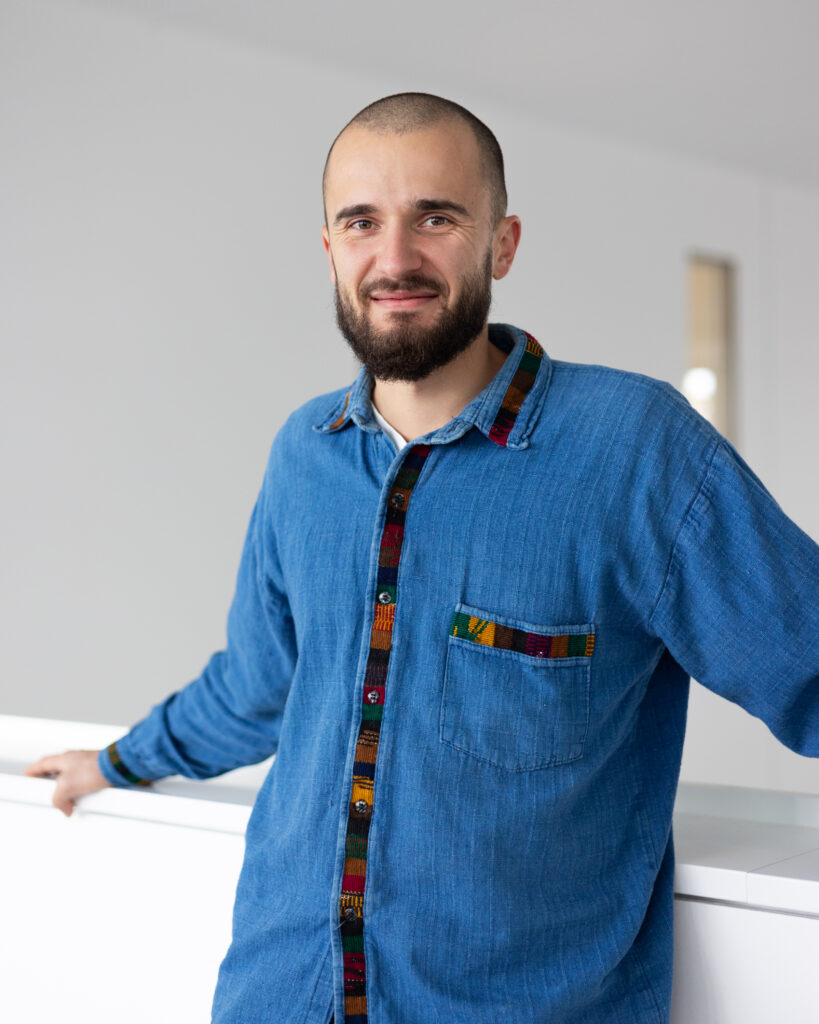
Marco Arnegger
Marco studied mechatronics at the TU Dresden. After his engagement at Clinicum Digitale in 2023, he moved to HybridEcho for his thesis. He was dedicated to the characterization and simulation of CMUT behavior. He finished his thesis successfully in April 2024 and continued working at Sunfire in Dresden. We wish you all the best!
This thesis focuses on the comparative analysis of the transmission behavior of piezoelectric and capacitive micromachined ultrasonic transducers (CMUTs) for ultrasound imaging, with an emphasis on nonlinear behavior. The objective is to evaluate and compare the nonlinear transmission properties of these transducers using finite element (FE) simulations and experimental measurements. The Swept-Sine Technique (SST) is applied to quantify nonlinearities in the transmission behavior at different operating points of the transducers.
The results reveal differences in the nonlinear transmission behavior between piezoelectric and CMUT transducers, with CMUTs exhibiting more pronounced nonlinear behavior under similar conditions. The study also examines the effects of varying bias and peak-to-peak voltages on the nonlinear characteristics of the transducers. The findings from the FE simulations largely align with the experimental results, providing insights into the factors influencing transducer nonlinearities. The thesis concludes that CMUTs exhibit stronger nonlinear behavior than piezoelectric transducers, which may impact their application in ultrasound imaging. Additionally, SST has proven to be an effective method for quantifying nonlinearities in the transmission behavior of transducers.
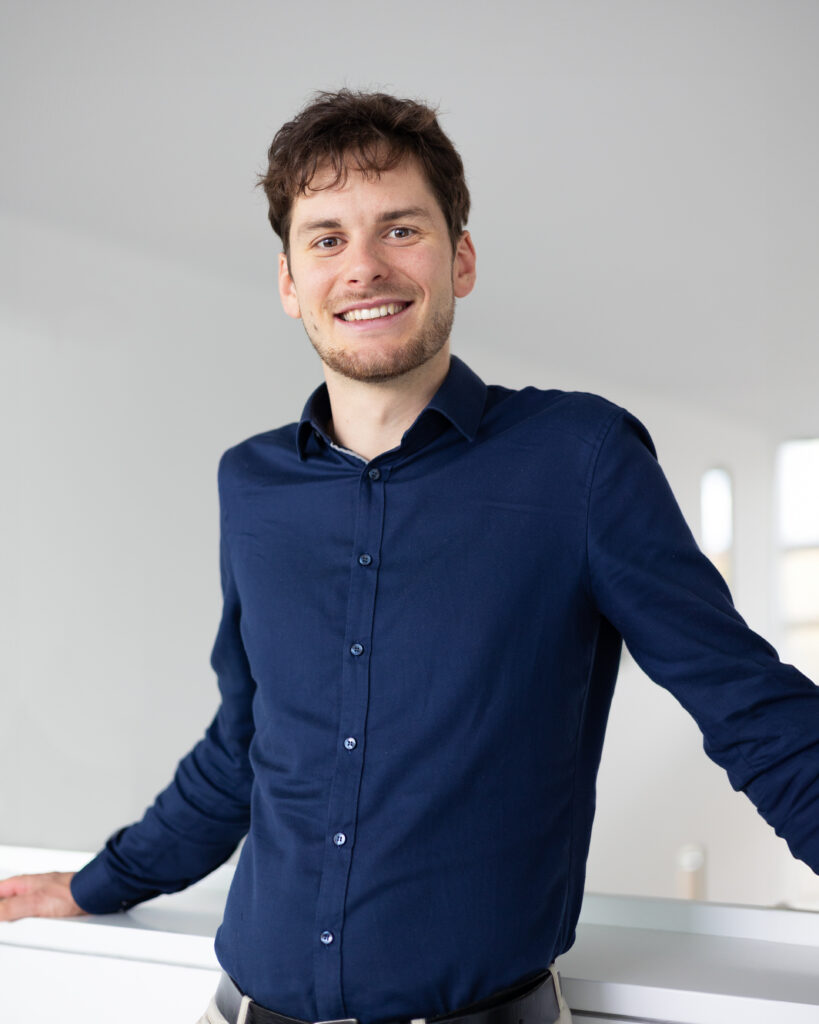
Tönnis Trittler
Tönnis studied mechatronics at TU Dresden (2016 – 2022). For his diploma thesis, he joined the HybridEcho research group, investigating the micromachining of the piezoelectric material PMN-PT with ultrashort laser pulses., receiving the KONTAKT-Price of the TU Dresden. After graduation he started his PhD in the HybridEcho Group.
Ultrasonic transducers primarily utilize piezoelectric composite materials, which consist of an active piezoelectric phase and a passive polymeric phase. Single-crystal PMN-PT is a promising material for transducers due to its excellent piezoelectric properties. However, its brittleness presents challenges in micromachining, typically performed using a dicing saw. This thesis investigates the structuring of PMN-PT using ultrashort laser pulses for the fabrication of 1-3 piezocomposites and compares it to conventional dicing saw processing. Theoretical models assess the influence of the processing-induced wall angle on transducer properties, revealing a significant decrease in the coupling factor for angles below 87°. Experimental studies identify optimal laser parameters for structuring PMN-PT, and samples are processed using both laser pulses and a dicing saw for comparison. The results demonstrate that 1-3 piezocomposites for 5 MHz can be successfully fabricated using ultrashort laser pulses, though limitations include processing time and a wall angle.
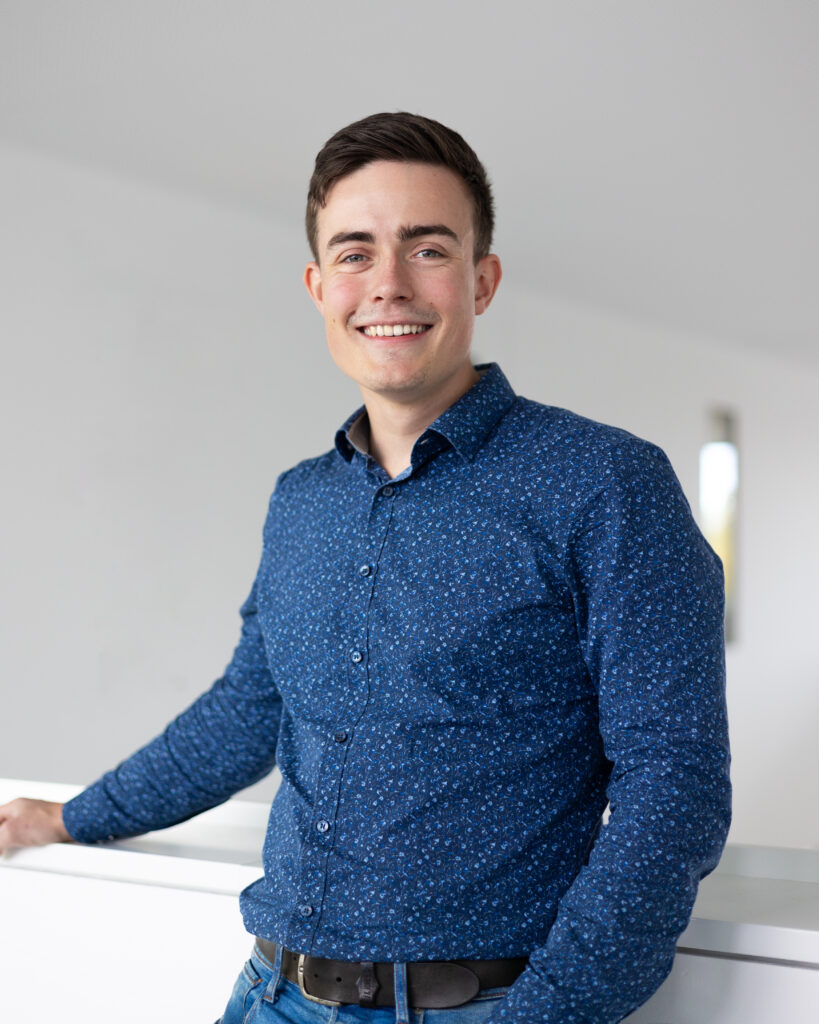
Julian Kober
Julian joined the research group in 2022 after attending the “Clinicum Digitale”. In his diploma thesis, he investigated the thermal behaviour of ultrasonic transducers during continuous broadband excitation. He continued his work as a PhD student at HybridEcho, focusing on the integration of broadband ultrasound transducers.
Sonography is one of the most important non-ionizing, real-time imaging modalities used in medical applications today. The current limitations in image quality and penetration depth could be significantly improved by using long or continuous coded waveforms, which have the potential to enhance the signal-to-noise ratio (SNR). However, these waveforms are associated with considerable loss-induced heating of the transducer, which has not been fully explored in the literature. This thesis investigates the thermal behavior of piezoelectric transducers under continuous excitation across a wide frequency range of 1–20 MHz. Thermal and vibration measurements are performed to understand the system and dominant loss mechanisms. Additionally, a finite element (FE) model is developed to predict the surface temperature rise of the transducer and compared with experimental results. The findings indicate that both thermal and vibrational behavior are highly frequency-dependent, with maximum heating occurring near resonance. Mechanical losses were identified as a major source of heating in resonance conditions. The simulation model showed strong deviations at high temperature increases, likely due to the limited thermal boundary condition adjustments in the FE software. Overall, this study contributes to a deeper understanding of the effects of continuous broadband excitation on piezoelectric transducers. Future work should include a larger number of transducers with lower manufacturing tolerances and variations in backing and matching layers to confirm and expand upon the observed relationships.
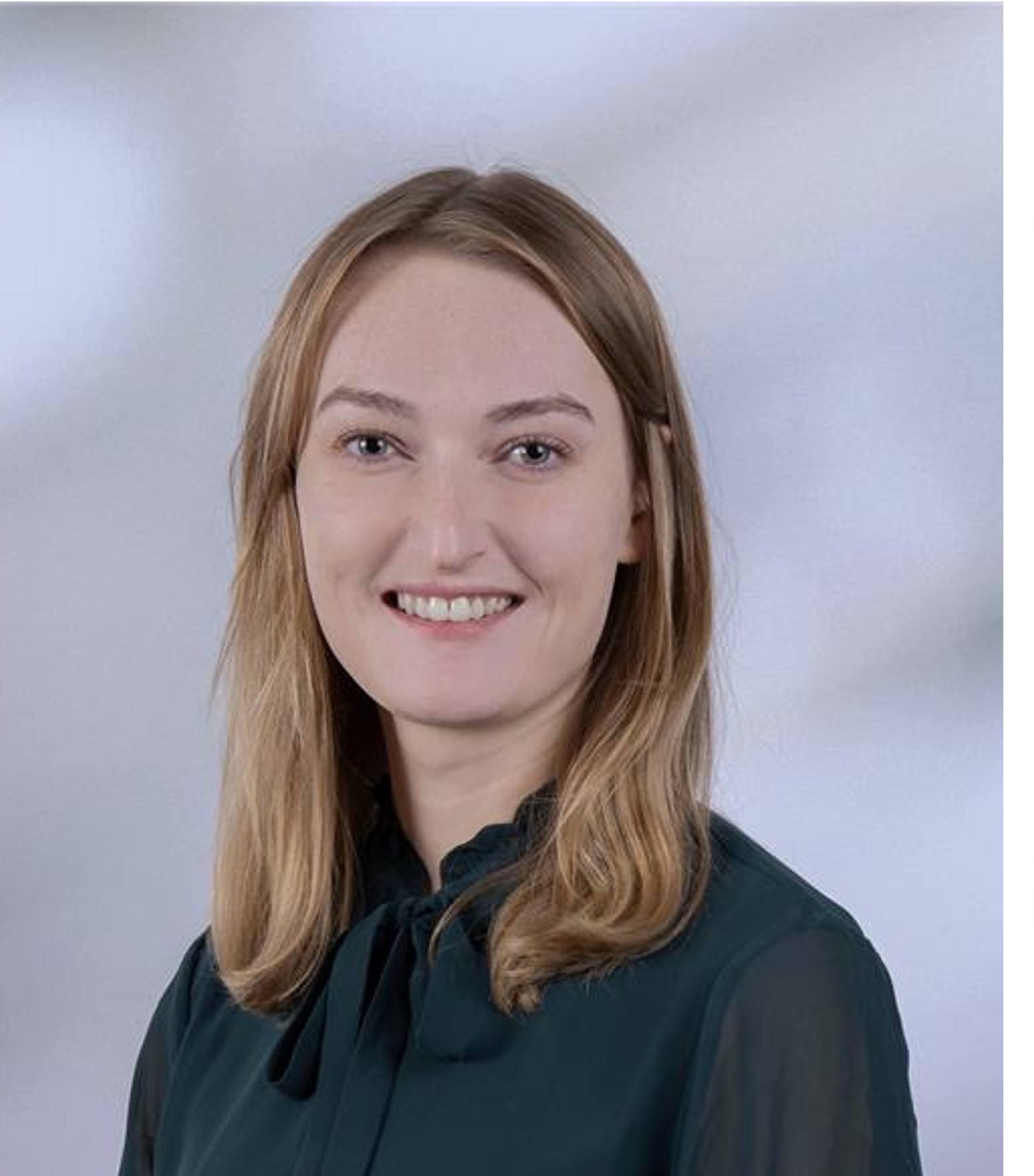
Luisa Recknagel
… Under construction
Two-photon lithography offers significant potential for the high-resolution structuring of matching layers, which could greatly enhance ultrasound diagnostics in the future. The design of such layers requires knowledge of the acoustic impedance of the polymers used. However, materials suitable for two-photon lithography are typically available only in small volumes, and their acoustic impedances are not well-documented, as they depend on manufacturing parameters. The goal of this thesis is to develop and apply a measurement method suitable for characterizing samples with minimum edge lengths of 200 µm, since conventional measurement methods are not designed for such small samples. This study investigates a reference measurement approach as a suitable method. Two measurements are conducted under identical conditions: one on a sample with known impedance and another on the test sample. By comparing both measurements, the unknown impedance can be determined. Various factors affecting accuracy, such as environmental temperature and surface properties of the samples, are analyzed and, if possible, compensated for. The resulting measurement accuracy exceeds 95%, with a standard deviation below 0.05 MRayl. The developed method allows for both an overall impedance determination and pixel-wise evaluation, enabling topographical representations. The approach is applicable to both microstructures and macroscopic samples with minimal surface condition restrictions. Despite surface roughness, the measurement remains valid due to the application of a threshold. However, factors such as measurement frequency and applied amplification influence the process, and further research is suggested to enhance its general applicability.
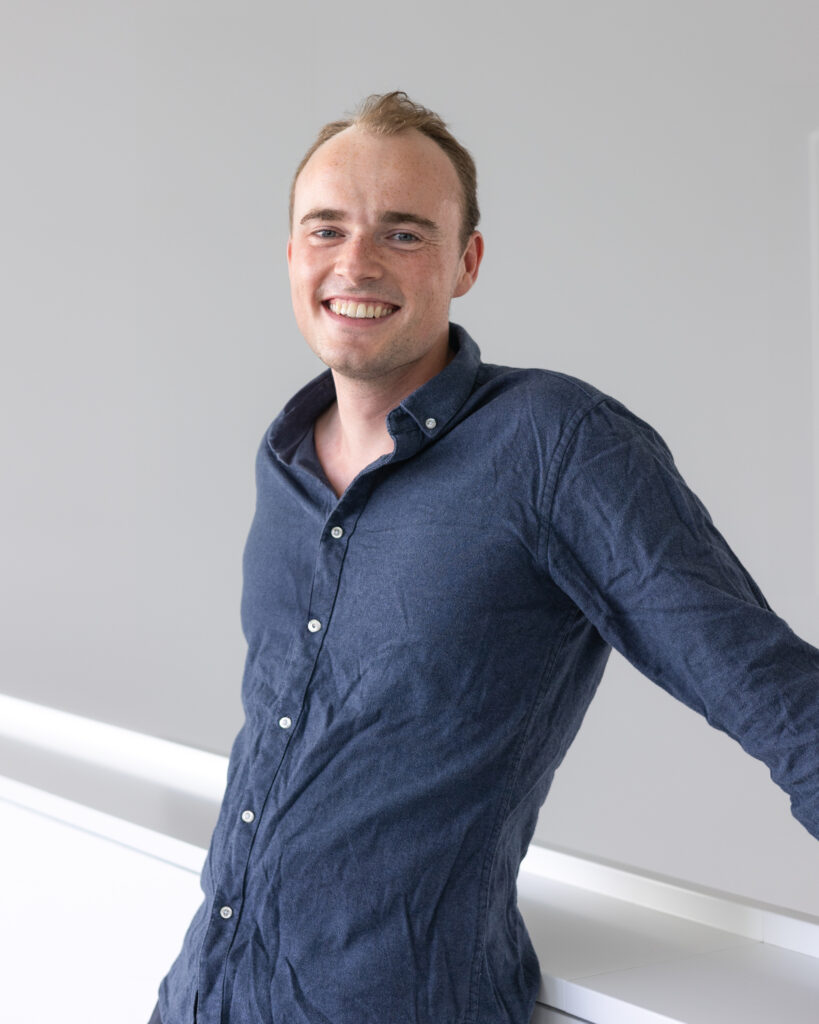
Jacob Florentin Urban
Jacob studied Industrial Design at TU Dresden and joined Hybrid Echo in 2024 after attending Clinicum Digitale. In his thesis he examined ways to improve the ergonomic properties of ultrasound probes in order to develop a new design. In December 2024 he sucessfully completed his Diploma thesis and will be a PhD-Student at the TU Munich from April 2025. All the best for your next steps!
This thesis explores the design and evaluation of a handheld ultrasound transducer, focusing on ergonomic and usability improvements for medical professionals. Despite being the most commonly used imaging technology in medicine, ultrasound devices have seen limited innovation, particularly in ergonomic design. The research, conducted within the Hybrid Echo research group at the EKFZ for Digital Health, aims to develop a new ultrasound probe that combines traditional piezoceramic transmitters with novel CMUT (Capacitive Micromachined Ultrasonic Transducer) receivers to enhance image quality. The study evaluates ergonomic parameters such as size, weight, and center of mass, and develops new probe designs through iterative prototyping and user testing with medical professionals. Results indicate that smaller, lighter probes with a patient-side center of mass are preferred, and that the new designs are generally accepted, with some users even preferring them over conventional probes. The modular design of the probe allows for adaptability to different use cases, offering potential for future technological integration. The findings suggest that ergonomic improvements can significantly enhance the usability and acceptance of ultrasound devices in clinical settings.

Merit Städler
Merit completed her studies in industrial engineering with a focus on electrical engineering at TU Dresden. She joined the HybridEcho team in 2024. For her thesis, she investigated methods for characterizing the behavior of CMUTs. She plans to continue her research with MEMS by starting a Ph.D. program next year.
Capacitive micromachined ultrasound transducer CMUTs have gained signicant attention due to their high exibility for application-specic optimization and their cost-ecient, scalable pro-duction. In recent years, their use has expanded from established ultrasound elds, such as medical imaging and industrial sensing, to emerging wearable consumer markets. With their potential for high receiver sensitivity and broad bandwidth, they are particularly promising as ultrasound receivers. However, this performance depends on several interrelated design parameters, including membrane size, shape, and tension. Therefore, a comprehensive characterization of the CMUT receiver behavior across dierent variants is essential to improve understanding of design trade-offs. In this study, ten CMUT variants were characterized for their application in medical imaging. The variants diered in terms of their membrane size, shape, array assembly and readout integrated circuit (ROIC) integration. A “pitch-and-catch” experiment was conducted in a water tank setup with the receiver and transmitter aligned in line of sight. With a single shot measurement, enabled due to coded chirp-excitation, a spectral analysis was conducted investigating the key performance parameters sensitivity and bandwidth. Additionally, the synchronized swept-sine technique was used to observe the harmonic orders that characterize the nonlinear behavior. Due to the manufacturer’s ROIC output constraint, the trade-o between sensitivity and dynamic range (DR) was also evaluated by determining the noise equivalent pressure (NEP) and maximal detectable pressure (MDP). The results showed that the CMUT with an integrated ROIC outperformed all variants with a separate ROIC across all measured parameters. Showing a 183.76% higher sensitivity, a 112.35% higher upper –6 dB frequency range and a 22.75% higher DR than the same variant with separated ROIC. Furthermore, the inuence of membrane size on the trade-o between sensitivity and bandwidth was conrmed: smaller membranes yielded higher bandwidth but lower sensitivity. Structural modications, such as embedding pistons, increased sensitivity by 31.45%, while rectangular membranes with a 4:1 aspect ratio extended the bandwidth by 60.60%. Nonlinearity eects were negligible, although higher transmitted pressures led to stronger nonlinear responses. The general characterization also highlighted the need for a deeper understanding of mutual acoustic impedance and production-induced pre-stress. Overall, the CMUT variant with the integrated ROIC demonstrated potential for ultrasound applications with high demands on penetration depth and resolution, such as liver ultrasound imaging. This can be attributed to its high receiver sensitivity, while the other variants exhibited values comparable to those of conventional piezoelectric transducers. The derived potential of the CMUT with integrated ROIC highlighted the benets of monolithic CMUT-microelectronics integration, emphasizing its use for miniaturized applications such as wearable systems. However, to be fully competitive as ultrasound technology, the investigated CMUTs still require improvements in noise performance, bandwidth uniformity, and center frequency control.
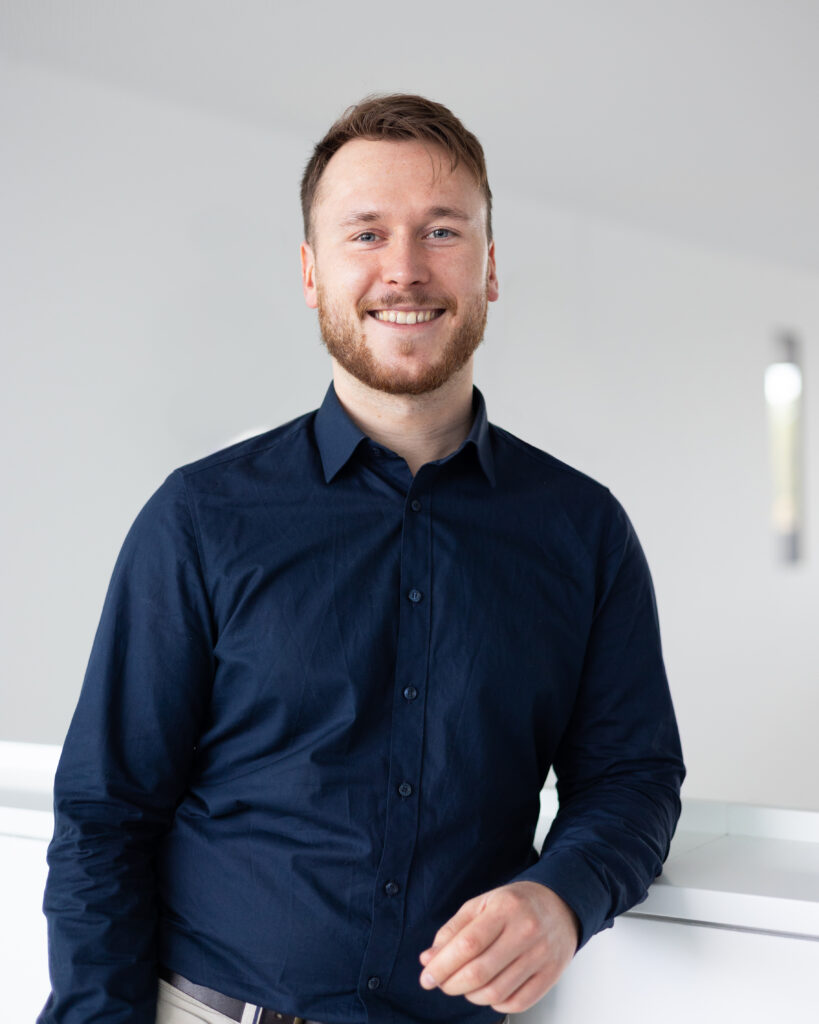
Edgar Dorausch
Edgar joined the HybridEcho group after visiting the Clinicum Digitale. He focused his master’s thesis on Fourier-based multistatic image reconstruction and finished it in 2022. Afterwards he continued his journey as PhD in the HybridEcho Group.
It is assumed that the hybrid use of piezoelectric elements and capacitive micromachined ultrasonic transducer (CMUTs) elements result in an increased signal SNR and bandwidth in ultrasound imaging. However, classical imaging techniques can not be implemented with such hybrid configurations. Thus inverse problem strategies for multistatic acquisition configurations are investigated for image formation in these settings. However, such methods go along
with an increase in computational overhead that has to be accomplished.
This work aims to compare the image reconstruction speed for Delay-and-Sum – a time domain imaging method , which is well known in the ultrasound community and a k-space based algorithm published in the context of radar imaging by Alvarez et al. [´Alv+14]. A model for ultrasound wave propagation is described and implemented as a simulation. Both algorithms are implemented in C++. The Implementations are validated using synthetic data produced by the simulation. A rigorous derivation of the k-space algorithm is given and time complexities
are determined regarding the Random Access Machine (RAM) computation model. The time complexities were validated by runtime measurements both algorithms. Several advantageous properties regarding the execution time of the k-space method compared to Delay-and-Sum are observed. However, it is also pointed out, that further research has to be conducted in order to apply the k-space method to a hybrid imaging setup.
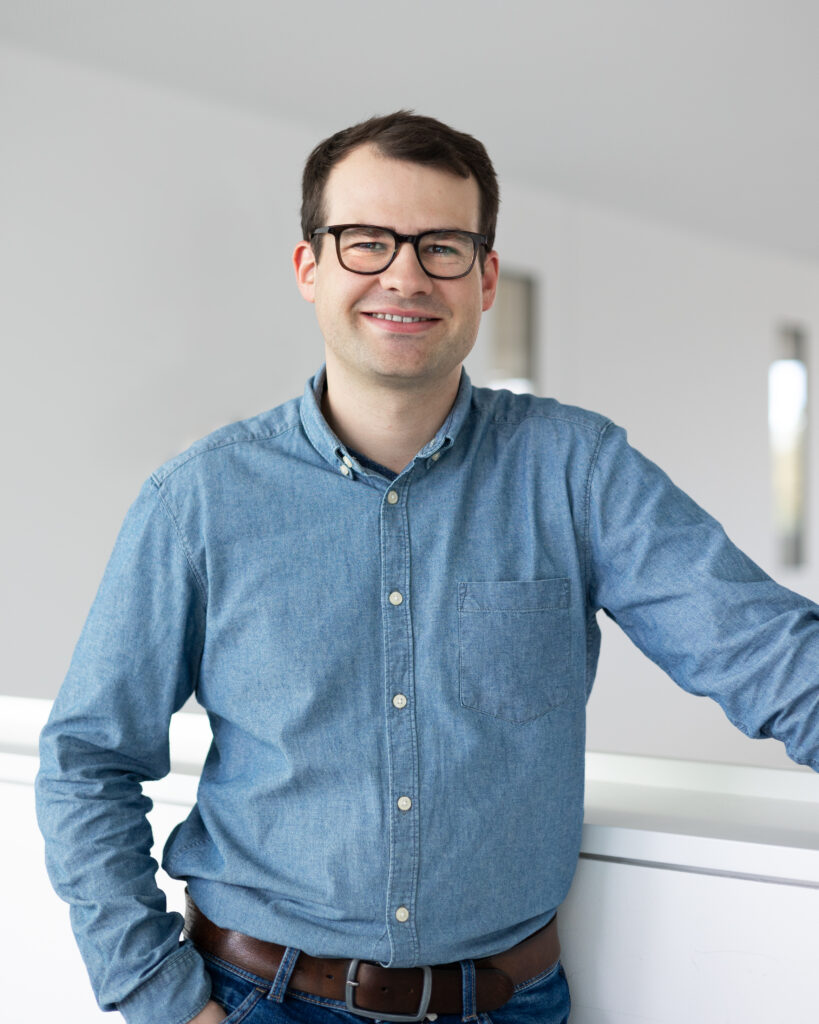
Cornelius Kühnöl
Cornelius studied Microelectronics at the FAU Erlangen-Nürnberg and joined the project through a research internship. In his Master’s thesis he investigated on coded signals for MIMO ultrasound. After Finishing his thesis in 2023 he joined the HybridEcho Team as PhD.
Ultrasound imaging is a key diagnostic tool in clinical practice, relying on the reflection of sound waves at tissue boundaries. Conventional ultrasound imaging techniques, while widely used, are limited in terms of image resolution and frame rate. To overcome these limitations, Multiple Input Multiple Output (MIMO) Synthetic Aperture (SA) imaging has emerged as a promising alternative. This technique utilizes multiple independent transmitting and receiving elements simultaneously, improving imaging performance.
This study investigates suitable waveforms for MIMO-SA ultrasound imaging, focusing on optimal autocorrelation and cross-correlation properties. A literature review identified two key multiplexing methods: Frequency Division Multiplexing (FDM) and Code Division Multiplexing (CDM). Various spreading codes and modulation schemes were analyzed, including pseudorandom sequences and Constant Amplitude Zero Autocorrelation (CAZAC) sequences. A comparative evaluation was performed using different signal metrics and a two-dimensional point scatterer model.
The results demonstrate that OFDM-modulated Zadoff-Chu sequences, a subset of CAZAC signals, exhibit the best characteristics for MIMO-SA imaging. These findings contribute to the advancement of high-resolution, high-frame-rate ultrasound imaging, with potential applications in real-time medical diagnostics.
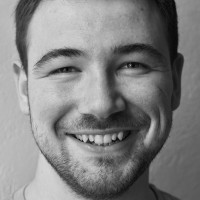
Julius Weber
… Under Construction
<b>UNDER CONSTRUCTION</b>
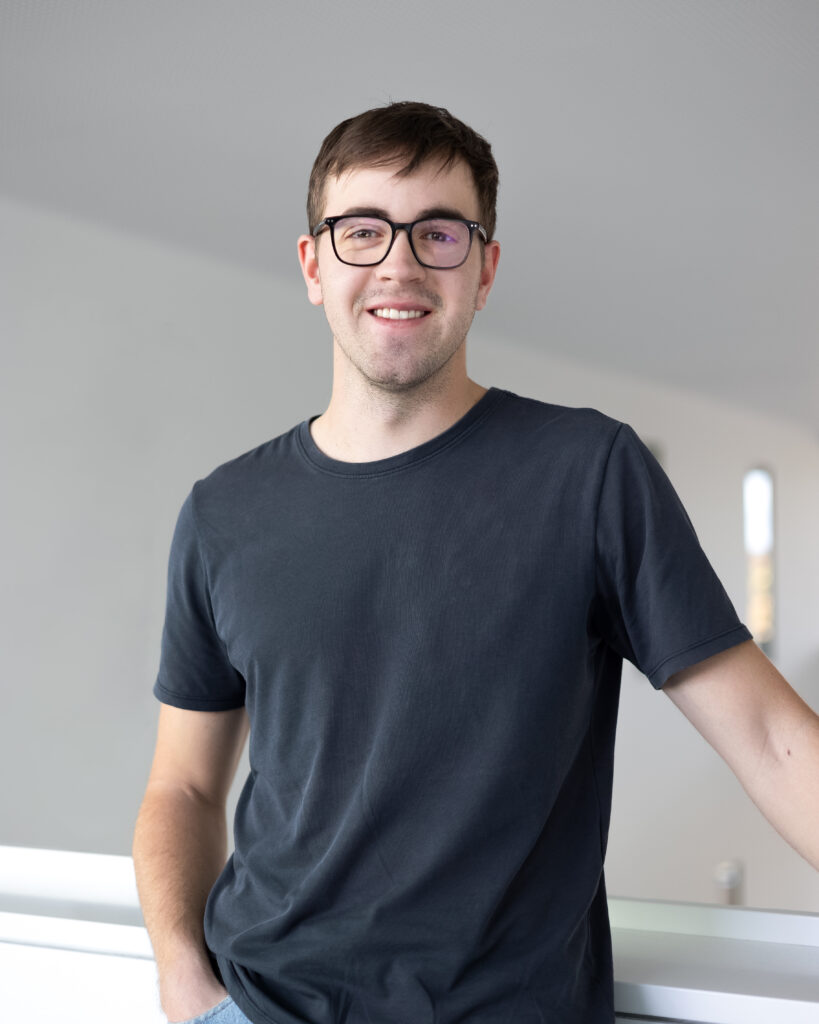
Franz Richter
Franz studies computer science and joined the HybridEcho research group as a student assistant in November of 2022 after visiting the Clinicum Digitale. Being generally interested in low-level code optimization, Franz did his Bachelor thesis on the real-time capabilities of a SoC for a specific imaging algorithm.
The utilisation of non-invasive Ultrasound (US) methods in an environment capable of real-time image reconstruction is of high interest for various medical fields. Widely adopted US handheld devices can further benefit from the low costs and the portability. With the emergence of more computationally intensive US imaging methods, the real-time aspect can be lost, resulting in the usage of external hardware. In this work, a Fourier-based imaging (FBI) algorithm will be implemented and optimized on a Snapdragon 8 (S8), to analyse the extent to which the System-On-Chip (SoC) is able to provide real-time execution. To profit from the inherent parallelism of the
integrated Graphics Processing Unit (iGPU), multiple optimizations techniques were applied to reduce the runtime of the algorithm. While evaluating the performed optimizations on several sets of simulation data, it could be shown that the defined real-time constraint is only met for certain parts of the FBI algorithm.
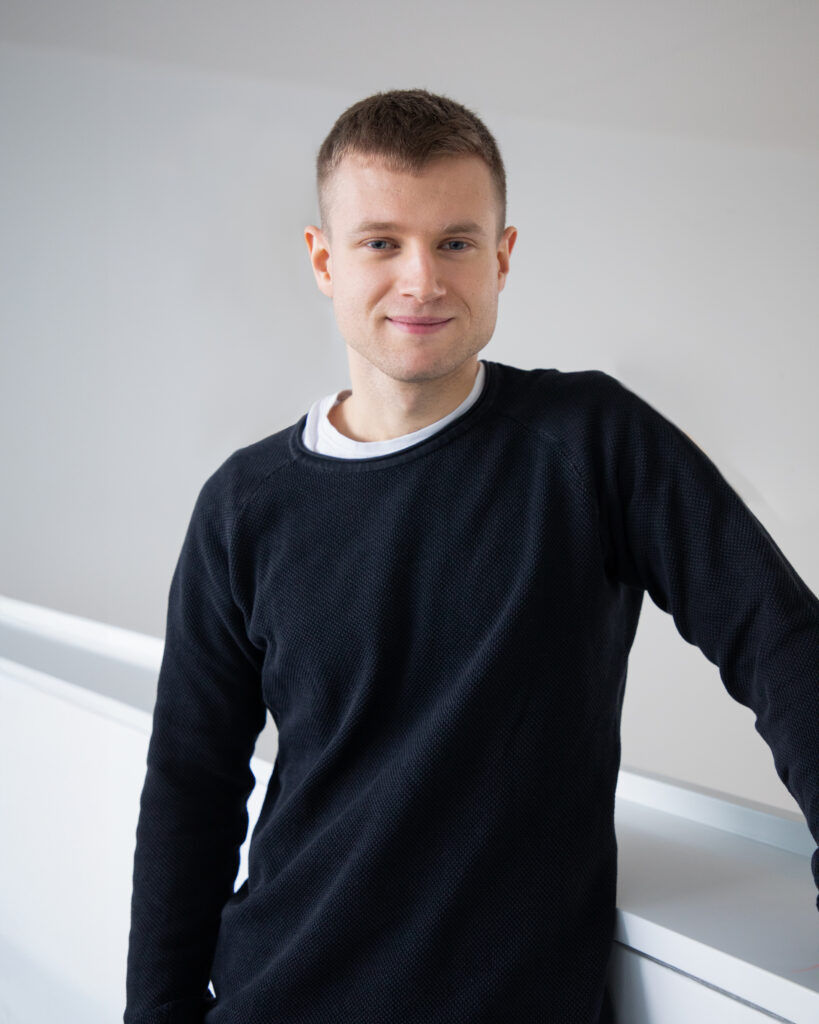
Pascal Stöver
After participating in the Clinicum Digitale in 2023, Pascal joined the HybridEcho team in 2024 to work on his diploma thesis. He investigated the implementation of Edgar Dorausch’s Fourier-based image reconstruction algorithm on an adaptive compute acceleration platform. After successfully finishing his thesis, Pascal continued to work as PhD at HybridEcho.
The efficient computation of the Fast Fourier Transform (FFT) is crucial for real-time medical ultrasound imaging, particularly in Fourier-based imaging (FBI). This thesis investigates the acceleration of FFT on the Xilinx Versal VCK190 System-on-Chip (SoC), leveraging its AI Engine architecture for parallel processing. The Cooley-Tukey algorithm is employed to optimize FFT execution across multiple AI Engine tiles, with a focus on reducing memory bottlenecks and maximizing computational throughput.
The study demonstrates that while FFT computation itself meets real-time constraints, data streaming between AI Engines remains a critical performance bottleneck. To address this, an optimized dataflow architecture is proposed, integrating memory-efficient buffering and packet-based data transmission. The results highlight the potential of AI-accelerated SoCs for high-speed signal processing, with implications beyond medical imaging, including radar and mobile communications. This work provides key insights into optimizing large-scale FFT computations in resource-constrained environments.
In collaboration with Fraunhofer IPMS, the HybridEcho Group investigates the potential of capacitive micromachined ultrasonic transducers (CMUTs) for ultrasonic applications. With many years of experience in ultrasound MEMS technology and its highly flexibel clean room processes Fraunhofer IPMS is supporting the special requirements of the HybridEcho development for super wideband signal use.
The Fraunhofer IKTS site in Dresden‐Klotzsche has been working since many years in research and development of methods and systems for nondestructive evaluation. It offers methods, sensors and devices for different kinds of nondestructive testing and covers the entire value chain, all the way to prototype production. For special applications, Fraunhofer IKTS designs and manufactures customized ultrasonic probes and methods based on model calculations that can be adapted to different geometries, materials and other acoustic parameters in the best possible way. With this knowledge, it supports the HybridEcho group in developing highly effective and broadband piezoelectric ultrasound emitters.
Infineon Dresden (IFD) is one of the largest and most modern semiconductor manufacturing and development sites. The main portfolio comprises discrete and smart power technologies, BiCMOS, embedded Flash, MEMS and Sensors. As partner in the HybridEcho Group IFD aims to develop MEMS-devices for medical applications.
Exelonix develops HW and SW for mobile communications systems especially in the area of the Internet of Things. The product portfolio comprises USB sticks with 4G/5G technologies, trackers, sensor nodes, and Bluetooth beacon enabled products, most connected to the cloud. In the HybridEcho Group Exelonix focuses on signal processing and interconnectivity.
In collaboration with Fraunhofer IPMS, the HybridEcho Group investigates the potential of capacitive micromachined ultrasonic transducers (CMUTs) for ultrasonic applications. With many years of experience in ultrasound MEMS technology and its highly flexibel clean room processes Fraunhofer IPMS is supporting the special requirements of the HybridEcho development for super wideband signal use.
The Fraunhofer IKTS site in Dresden‐Klotzsche has been working since many years in research and development of methods and systems for nondestructive evaluation. It offers methods, sensors and devices for different kinds of nondestructive testing and covers the entire value chain, all the way to prototype production. For special applications, Fraunhofer IKTS designs and manufactures customized ultrasonic probes and methods based on model calculations that can be adapted to different geometries, materials and other acoustic parameters in the best possible way. With this knowledge, it supports the HybridEcho group in developing highly effective and broadband piezoelectric ultrasound emitters.
Infineon Dresden (IFD) is one of the largest and most modern semiconductor manufacturing and development sites. The main portfolio comprises discrete and smart power technologies, BiCMOS, embedded Flash, MEMS and Sensors. As partner in the HybridEcho Group IFD aims to develop MEMS-devices for medical applications.
Exelonix develops HW and SW for mobile communications systems especially in the area of the Internet of Things. The product portfolio comprises USB sticks with 4G/5G technologies, trackers, sensor nodes, and Bluetooth beacon enabled products, most connected to the cloud. In the HybridEcho Group Exelonix focuses on signal processing and interconnectivity.
more information coming soon
SITEC is valued across the world as a partner and supplier of automated production systems and for series manufacturing of modules and components. Our strengths include the optimisation of technological sequences and flexible reaction to the challenges of a dynamic market with ever-shorter product cycles. In the in-house application center, 14 different laser sources of different designs and wavelengths are available for technology development. Based on the highest quality and environmental standards, SITEC offers efficient production technologies and complete turnkey solutions Made in Germany.
<div class=”w-popup-box-content”>
WOLFRAM Designer und Ingenieure (WDI) offers user-centered engineering and design services. The interdisciplinary team of designers and engineers provides product development for the market entry of technical innovations. WDI supports the HybridEcho research group in the product development process:
<ul>
<li>product conception and product design</li>
<li>usability conception, user interface design and user experience</li>
<li>mechanical engineering, technology integration and prototyping</li>
</ul>
</div>
HETEROMERGE is a StartUp company that offers complete multi-material solutions for 3D micro-printing to realize high-performant functional systems. Based on our multi-material print head, we provide automated in situ material exchange in two-photon 3D laser-printing. As partner in the HybridEcho group, we support the fabrication of novel ultrasonic transducer elements via micro-additive processes.
More information coming soon
SITEC is valued across the world as a partner and supplier of automated production systems and for series manufacturing of modules and components. Our strengths include the optimisation of technological sequences and flexible reaction to the challenges of a dynamic market with ever-shorter product cycles. In the in-house application center, 14 different laser sources of different designs and wavelengths are available for technology development. Based on the highest quality and environmental standards, SITEC offers efficient production technologies and complete turnkey solutions Made in Germany.
WOLFRAM Designer und Ingenieure (WDI) offers user-centered engineering and design services. The interdisciplinary team of designers and engineers provides product development for the market entry of technical innovations. WDI supports the HybridEcho research group in the product development process:
<ul>
<li>product conception and product design</li>
<li>usability conception, user interface design and user experience</li>
<li>mechanical engineering, technology integration and prototyping</li>
</ul>
HETEROMERGE is a StartUp company that offers complete multi-material solutions for 3D micro-printing to realize high-performant functional systems. Based on our multi-material print head, we provide automated in situ material exchange in two-photon 3D laser-printing. As partner in the HybridEcho group, we support the fabrication of novel ultrasonic transducer elements via micro-additive processes.
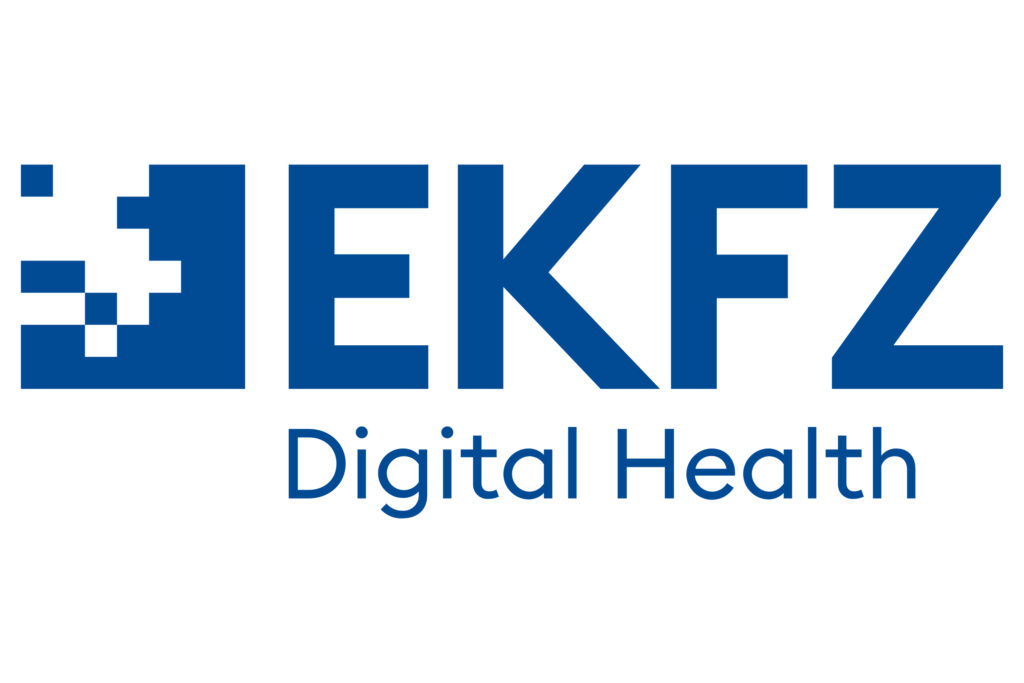
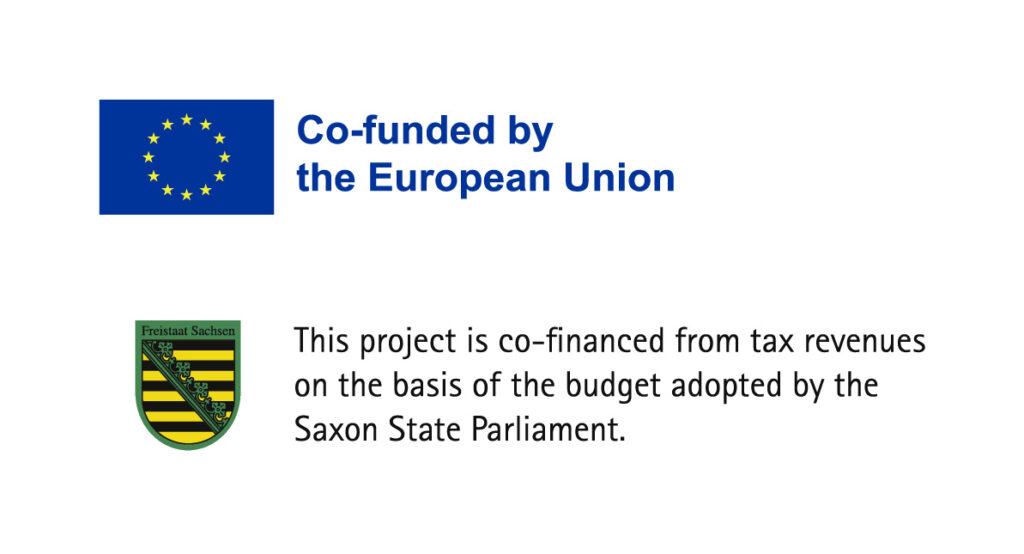
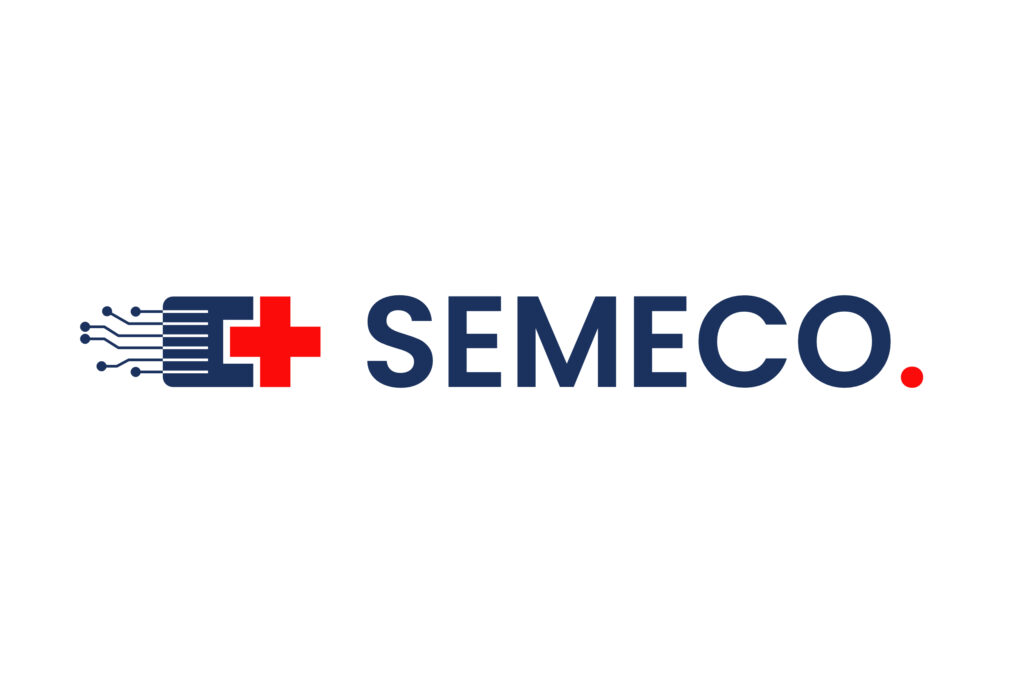
HybridEcho is also part of the Cluster4Future SEMECO. The Free State of Saxony is additionally funding this project. HybridEcho complements the innovative pool of ideas in the cluster ecosystem.


